

























Spouses of DGEs with RI Directors
12 Regionalisation and federalism, the way forward: Bharat Pandya
RC Calcutta celebrated its 100th birthday with a grand felicitation event attended by senior leaders from India and overseas.
20 Holger Knaack sees opportunities for Rotary to change, thrive
The incoming RI President announces his theme for the next year at the International Assembly in San Diego.
22 Let us do service projects that reflect 10 per cent of government work: Shekhar Mehta
Rotarians now need to lend a hand to the Government and do big comunity service projects.
26 Lending a helping hand to educate college girls
RC Madras North provides financial aid for needy college girls.
32 Let’s leverage the collective power of charity: RIDN Venkatesh RID 3232 celebrates a home-grown leader.
48 Institute honours strongwilled achievers
The Dare to Dream Awards were presented to people who faced challenges and emerged successful.








52 RC Nagpur plays Santa Claus to mentally-challenged children on its 75th Charter Day



The club commemorated its platinum jubilee by delighting the community with various initiatives. 32 12
On the cover: Spouses of some of the Indian DGEs at the International Assembly held in San Diego.
Picture © rotary.org







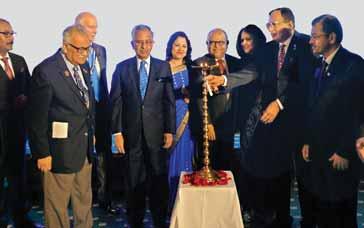


Iam delighted at the unique action photograph of Durga Vandana at the Indore Institute on the January cover, captured by V Muthukumaran. In the Editor’s Note titled An institute to remember , the essence of the Institute was captured. RI Director Bharat Pandya with his uncanny ability kept a tight control on the events. My compliments to the Editor and her team for bringing out a beautiful magazine full of Rotary information and club projects.
Indore Institute in colourful pages

continue to suffer cruelty, abuse and subordination at home. How can such women dare to speak up?
Raj Kumar Kapoor RC Roopnagar — RID 3080
Ilookforward to Rotary News every month and read it at one go. The Jan issue has covered the Indore Institute so well that I felt I had attended the event. The photographs are very good and covered all aspects of the Institute.
districts of West Bengal. Looking forward to the next issue.
R K Bubna RC Belur — RID 3291
Congratulations to PRID Ashok Mahajan on getting the prestigious Polio Pioneer Award at the Indore Institute. The TRF Star Performers deserve kudos for their magnanimity.
All speeches made by Rotary leaders at the Institute were superb. The colourful pictures of the sessions make the issue interesting to both see and read.
Another thought-provoking article is Women seek opportunities, not favours to succeed. There is hue and cry for women’s empowerment but if women can’t have a say in the decision-making process, how can they be empowered?
Swami Vivekananda has rightly said, “just give them education and they are capable enough to get empowered.” Empowering women and girls is key to social transformation. Patriarchy is rampant in our households and society as women
Thearticle Group dynamics work best in Rotary: Shekhar Mehta gives excellent guidelines to newly-inducted Rotarians. A collective team of Rotarians makes it possible to do noble work for society. The eradication of polio from India is one such group dynamics at work. This initiative has saved the
The President Speaks has emphasised upon the Four-Way-Test. Our club gave the Four-Way-Test Award to Sindhutai Sapakal, who has adopted over 1,400 children. This award function was attended by RIPN Shekhar Mehta who assured all help from Rotary to Sindhutai. The report on TRF Seminar is informative and interesting. Our club is implementing a global grant worth ` 1 crore which will cover WinS project in 20 schools at Kolkata and few
lives of children especially those from underprivileged families who were not aware of the crippling disease. Thanks for publishing excellent articles in Rotary News
T D Bhatia, RC Delhi
Mayur Vihar — RID 3012
Itwas a much-needed seminar that was
Smriti Irani’s statement that “we need to start from home, as we are responsible for how our sons perceive women or how our daughters stand up for their rights” is thought-provoking.
The message on vocational service by RI President Mark Maloney explains the purpose of joining Rotary to new members. Glad to read that RC Calcutta is turning 100 in January 2020. Maloney’s remarks on the challenges facing Rotary are an eye-opener.
hosted by RC Seven Hills Dharwad, RID 3170, on MHM. Rotary is a platform where woman and men can jointly discuss the problems that arise during menstruation without inhibitions.
The concept of introducing reusable pads and menstrual cup is a noble idea. Distribution of Happy Kits to school girls and
educating them about the importance of washing hands and using toilets is the main takeaway from this seminar. The event reflected the bondage between four Rotary districts which had gathered for a common social cause.
Chinmaya Mahapatra
RC Bhubaneswar Heritage — RID 3262
Trustee Chair-elect PRIP K R Ravindran’s comments on spending prudently TRF funds for projects are noteworthy. I am delighted to note that the number of AKS members has crossed 1,000 and India stands second in the list. Mother Teresa’s formula for giving is marvellous: “Give till it hurts, and then some more.”
Overall, the January issue is superb and sustains its quality.
Philip Mulapone M T RC Trivandrum Suburban — RID 3211
Thepanoramic views along with illustrative pictures on the Indore Institute make the Jan issue innovative and holistic. This is evidence of the excellent journalism being pursued by Team Rotary News. Congrats and keep it up.
Dr B Nagalingam Pillai RC Nagercoil — RID 3212
Iwasimpressed with RIPN Shekhar Mehta’s address to the DGEs. His message Think from the heart, not the mind is very true and if followed, will bring huge transformation in our societies. Let us all
While going through the cover story Suicide is a cry for help, I was shocked to note that people are inclined to take extreme steps for various reasons ranging from education, family problems to health issues. But the major cause for suicide is the inability to tolerate the intensity of depression.
It is wonderful to see the helpline Sneha, founded by
work together to realise his dream of making India literate by 2025. R Thayumanavan RC Cuddalore Midtown — RID 2981
RIPresident Mark Maloney has rightly spoken on vocational service built on the highest ethical standards. As a Rotarian for over 20 years, I have come across club members with such qualities and as perfect followers of the Four-Way-Test.
Editor Rasheeda’s article on Sarafa Bazaar in Indore shows how much she and her colleagues relished the food variety in this market known for its diverse taste. She has paid glowing tributes in her Editor’s Note to RI Director Dr Bharat Pandya and Institute Chairman Raju Subramanian for a well-organised Zone Institute. RIPN Shekhar Mehta has urged the DGEs to “think from the heart, not the mind”, a timely advice to future district governors. To tackle the stagnation in membership, each Rotarian must induct a new member, which if done, will double Rotary’s membership.
Dr Lakshmi, offering 24x7 support with a team of volunteers for depressed people. Having a good family life with friends and social interactions will go a long way to avoid suicidal thoughts.
N Jagatheesan
RC Eluru — RID 3020
Our aviation officials must take note of the relevant message conveyed
Let us all wish Dr Bina Vyas, the incoming IIW President, the very best in her endeavour. She will be the seventh Indian to hold the coveted post and we wish that she has a good successful term as IIW chief. It is heartening to read that Rotary Founder Paul Harris’s home in Chicago would be rebuilt with contributions from Rotarians. I hope the donations pour in to accomplish the task in time.
S Muniandi, RC Dindigul Fort — RID 3000
Thearticle Binging on street food in Indore has influenced my family so much that we have booked our tickets to Indore in February. The coverage and photographs are very informative. Thank you for helping us plan our vacation.
Rakesh Bhatia
RC Belur — RID 3291
Onceagain the Editor was able to bring live before us the happenings at the Zone Institute with her enchantingly-written editorial. Keep it up.
V G Deodhar
RC Nasik — RID 3030
in the article Ouch… those late night flights! by TCA Srinivasa Raghavan and take corrective steps. My greetings for a happy and
prosperous new year to the editorial team.
K Devarajan
RC Coimbatore East — RID 3201
We welcome your feedback. Write to the Editor: rotarynews@rosaonline.org; rushbhagat@gmail.com
Click on Rotary News Plus in our website www.rotarynewsonline.org to read about more Rotary projects.
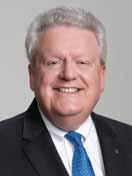
Happy115th birthday, fellow Rotarians and members of the family of Rotary!
Much has changed in the world since 1905. Then, the global population was roughly 1.7 billion. Today, it is 7.7 billion. There were five telephones for 100 people in the United States 115 years ago. In 2020, it is estimated that 96 per cent of the US population has a cellphone — and both China and India have more than a billion cellphones in use.
In the 115 years since Rotary was founded, seemingly everything has changed except Rotary values. We began, and remain, committed to fellowship, integrity, diversity, service, and leadership. While our Service Above Self motto dates to 1911, the ethos behind those words had already been ingrained by Rotary’s founders.
As the pace of change worldwide continues to accelerate, the need for Rotary service is greater than ever. It’s one thing to read about service projects, quite another to see them in action and to see the grateful faces of people who have benefited from them. Rotary projects change lives and connect the world. And over the past year, I have seen some amazing Rotary projects in action.
Gay and I visited Japan’s Fukushima prefecture last year. Few places in the world have had to deal with the kind of devastation that visited Fukushima in March 2011, when a tsunami touched off by an earthquake led to disaster at a nuclear power plant. But the story of Fukushima today is not one of destruction; it is one of hope and renewal. Rotary grants have helped improve access to medical and mental healthcare for victims of the

disaster and reduced the isolation of these communities by sharing the experiences of people from other parts of the world who have also recovered from disasters. Our grants have also helped to foster self-motivation and encourage sustainable long-term community recovery across the region.
In Shanghai, I learned about the Careers in Care programme. This helps migrant workers fill the need for skilled professionals in elder care facilities. After taking a course, trainees receive certification to boost their employment prospects, while the elder care industry benefits from an expanded talent pool. Rotary projects like this are successful because they address a local need, and they have the potential to attract local government funding to sustain their impact.
And in Guatemala, Gay and I went to Sumpango. Global grants there provide mechanical cows to produce soy milk; an improved water distribution system; water filters; clean compost latrines; family gardens; support for income generation; and training in WASH and literacy programmes. The food items sold there not only provide nutrition to women and children, but also create a source of income for local women.
In every area of focus, and in every part of the world, Rotary projects are improving lives and helping communities adapt in a time of rapid change. As we celebrate another great year for Rotary, let us rededicate ourselves to strengthening the connections that make our service so impactful. We will make lives better as Rotary connects the world
Mark Daniel Maloney President, Rotary International

hen RI President-elect Holger Knaack unveiled his theme at the International Assembly — Rotary Opens Opportunities — the first recall was of RI Director Bharat Pandya’s pet mantra on Rotary being all about “hope and opportunities”. As Rotary Club of Calcutta celebrated its 100th birthday bang on the New Year, he once again reiterated that “hope is what the community has in Rotary… that it will do something to improve their lives and make the world a little better.”
Our RI Director was totally in sync with his incoming President when he said that Rotary gives opportunity “to you and I to fulfill that hope to make our world a little better place.” Knaack expressed a similar thought process when he said that Rotary wasn’t just a “club for people to join”. Rather, it was “an invitation to endless opportunities,” and a Rotary membership creates pathways for members to improve their lives and the lives of those they help through service projects. “We believe that our acts of service, big and small, create opportunities for people who need our help,” Knaack said.
In addition, Rotary also creates leadership opportunities and gives members the chance to travel the world to put their service ideas into action and make lifelong connections. “Everything we do opens another opportunity for someone, somewhere.”
Consider the essence and depth of the profound statement Knaack has made through his theme, and then elaborated upon it. Rotary provides opportunities to both its members and the needy people in the community who get a helping hand from Rotarians. If you consider its impact in totality — the opportunity got by a Rotarian to do good through her service, plus the
opportunity to become a leader, travel the world, make new friends and connections, and, in addition, give opportunities to those it helps to improve their lives and livelihoods. You don’t need to be a mathematician to see that this is not an addition but a multiplication of opportunities.
Isn’t ‘opportunity’ a wonderful word? It encompasses so many wonderful and positive qualities… hope, strength, hard work, success. This is exactly what the ‘second sex’, as the French intellectual Simone de Beauvoir titled her famous book published way back in 1949, referring to women, seeks. Interestingly, the famous French philosopher Jean Paul Sartre, who remained her partner for 51 years (she told him “don’t be silly” when he proposed to her) until he died in 1981, had once told her that she had a “man’s intelligence” and for a long time she accepted it as a compliment, until she began to consider what it implied. It implied, she’d write later, that “humanity is male and man defines woman”!
The finer points on intelligence apart, a topic suitable for a heated debate from any platform, it is opportunities that those who have been deprived or left behind require. And women certainly belong to this group. As women’s membership in Rotary increases, a goal pursued by senior RI leaders across the world, and more leadership positions open out for women within Rotary, as is happening, slowly but surely, the focus on women’s empowerment, within and outside the organisation, is bound to sharpen. The world is already seeing sterling women’s leadership in Germany’s Angela Merkel and a different kind of leadership in New Zealand’s Jacinda Ardern.
May their tribe increase…
Rasheeda Bhagat
RI Dist 2981
RI Dist 2982
RI Dist 3000
RI Dist 3011
RI Dist 3012
RI Dist 3020
RI Dist 3030
DG N Manimaran
DG Natesan A K
DG Dr A Zameer Pasha
DG Suresh Bhasin
DG Deepak Gupta
DG M Veerabhadra Reddy
DG Rajendra Madhukar Bhamre
RI Dist 3040 DG Dhiran Datta
RI Dist 3053
DG Harish Kumar Gaur
RI Dist 3054 DG Bina Ashish Desai
RI Dist 3060 DG Anish Shah
RI Dist 3070 DG Sunil Nagpal
RI Dist 3080 DG Jitendra Dhingra
RI Dist 3090 DG Rajeev Garg
RI Dist 3100 DG Hari Gupta
RI Dist 3110 DG Kishor Katru
RI Dist 3120 DG Sanjay Agrawal
RI Dist 3131 DG Ravee Dhotre
RI Dist 3132 DG Suhas Laxmanrao Vaidya
RI Dist 3141
DG Harjit Singh Talwar
RI Dist 3142 DG Dr Mohan Chandavarkar
RI Dist 3150 DG Pandi Sivannarayana Rao
RI Dist 3160 DG Nayan S Patil
RI Dist 3170 DG Dr Girish R Masurkar
RI Dist 3181 DG Joseph Mathew
RI Dist 3182 DG Ramesh B N
RI Dist 3190
DG Dr Sameer Hariani
RI Dist 3201 DG R Madhav Chandran
RI Dist 3202 DG A Karthikeyan
RI Dist 3211
RI Dist 3212
RI Dist 3231
RI Dist 3232
RI Dist 3240
DG Shirish Kesavan
DG S Sheik Saleem
DG Sridar Balaraman
DG G Chandramohan
DG Dr Debasish Das
RI Dist 3250 DG Gopal Khemka
RI Dist 3261 DG Ranjeet S Saini
RI Dist 3262 DG Debasish Mishra
RI Dist 3291
DG Ajay Agarwal
Printed by P T Prabhakar at Rasi Graphics Pvt Ltd, 40, Peters Road, Royapettah, Chennai - 600 014, India, and published by P T Prabhakar on behalf of Rotary News Trust from Dugar Towers, 3rd Flr, 34, Marshalls Road, Egmore, Chennai 600 008. Editor: Rasheeda Bhagat.
The views expressed by contributors are not necessarily those of the Editor orTrustees of Rotary News Trust (RNT) or Rotary International (RI). No liability can be accepted for any loss arising from editorial or advertisement content. Contributions –original content – are welcome but the Editor reserves the right to edit for clarity or length. Content can be reproduced, but with permission from RNT.

Working for peace has always been a priority for Rotary. Rotary’s journey began with the simple object of friendship and the spirit of mutual cooperation — two ingredients important for peace. Our work for peace doesn’t happen at conferences and seminars; it happens through personal relationships, meeting basic human needs, and working one-to-one to resolve conflicts. Peace has two aspects — absence of conflict and war; and developing conditions in our communities that allow people to progress, meet basic needs and allow a quality of life conducive to peace.
When basic needs are not met peace is difficult to achieve. Every time we bring water to those without water, provide an opportunity for literacy or give another child polio drops, we do what Rotarians do, that is, creating the basic conditions needed for peace. Rotarians are at the forefront of working for peace by rebuilding schools in Uttarakhand, providing school benches in Andhra Pradesh, empowering women in rural Maharashtra, vocational training in Tamil Nadu or flood relief in Kerala.
Peace does not mean to live in a place without noise, problems, hard work and pain. Peace means that despite being in the midst of all these things we remain calm. This is the true meaning of peace. Every time we turn on the news channels, we see violence, suffering, and injustice happening on our planet. Sometimes we are silent, sometimes we speak out and take action.
But how we act and what we say are always guided by our thoughts and feelings, over which we have control and responsibility. Only by first “being the change” as Gandhiji put it — being peaceful, being loving and calm ourselves — can we bring greater peace, love and wisdom to the world around us.
Be the peace you want to see in the world. It starts within the hearts of each of us and spreads out from there. That will truly ensure Rotary connects the world. Enjoy Rotary, Enjoy Yourself.

Dr Bharat Pandya RI Director, 2019–21
Dear Rotary leaders,

Conflict and violence displaced more than 68 million people in the past year, and half of these are children. We Rotarians should refuse to accept conflict as a way of life. Rotary projects provide training that fosters understanding and provides communities with skills to resolve such conflicts.
Through our service projects, peace fellowships and scholarships, our members are taking action to address the underlying causes of conflict, including poverty, inequality, ethnic tension, lack of access to education and unequal distribution of resources.
For me, peace is giving food to the hungry, limbs to the handicapped, sight to the blind, home to the homeless, water to the thirsty and opportunity to learn for the illiterate.
If we want a society to be at peace, a society which is progressive, where each individual lives with dignity, then we have to be the torchbearers to take this forward. I challenge each Rotarian to be a smile creator, a wizard of goodness, and lend a hand to the needy.
Rotary’s most significant effort to wage peace is the Rotary Peace Centres programme, established in 2002. Each year, the programme trains some of the world’s most dedicated and brightest professionals, and prepares them to promote national and international cooperation and resolve conflict. They include graduates of a two-year Master’s degree and a three-month professional certificate programme at Rotary’s partner universities.
Today, more than 900 peace fellows are applying their expertise in various fields. They’re settling border conflicts in West Africa, developing aid programmes at the World Bank, drafting legislation to protect exploited children in Brazil, providing security for diplomats, and taking up other career paths devoted to peace.
In the words of Eleanor Roosevelt: “It isn’t enough to talk about peace. One must believe in it. And it isn’t enough to believe in it. One must work it.”
So I urge each one of you to be an angel of giving.

Kamal Sanghvi RI Director, 2019–21
Board of Permanent Trustees & Executive Committee
PRIP Rajendra K Saboo RI Dist 3080
PRIP Kalyan Banerjee RI Dist 3060
RIPN Shekhar Mehta RI Dist 3291
PRID Panduranga Setty RI Dist 3190
PRID Sushil Gupta RI Dist 3011
PRID Ashok Mahajan RI Dist 3141
PRID Yash Pal Das RI Dist 3080
PRID P T Prabhakar RI Dist 3232
PRID Dr Manoj D Desai RI Dist 3060
PRID C Basker RI Dist 3000
TRF Trustee Gulam A Vahanvaty RI Dist 3141
RID Dr Bharat Pandya RI Dist 3141
RID Kamal Sanghvi RI Dist 3250
Executive Committee Members (2019–20)
DG Deepak Gupta RI Dist 3012
Chair – Governors Council
DG Nayan Patil RI Dist 3160
Secretary – Governors Council
DG Dhiran Datta RI Dist 3040
Secretary – Executive Committee
DG Ajay Agarwal RI Dist 3291
Treasurer – Executive Committee
DG Rajendra Madhukar Bhamre RI Dist 3030
Member – Advisory Committee
ROTARY NEWS / ROTARY SAMACHAR
Editor Rasheeda Bhagat
Senior Assistant Editor Jaishree Padmanabhan
ROTARY NEWS / ROTARY SAMACHAR
ROTARY NEWS TRUST 3rd Floor, Dugar Towers, 34 Marshalls Road, Egmore Chennai 600 008, India. Phone : 044 42145666
e-mail: rotarynews@rosaonline.org Website: www.rotarynewsonline.org
Now share articles from rotarynewsonline.org on WhatsApp.
$38,093 $198,122 $73,491 $46,315 $326,099 $69,958 $5,234 $15,421 $92,236 $41,720 $243,785 $32,613 $62,716 $10,814 $22,865 $18,662 $60,386 $419,513 $30,218 $598,892 $185,454 $266,109 $3,136 $53,646 $135,510 $48,653 $134,469 $149,774 $125,215 $61,839 $50,866 $6,674 $233,800 $137,719 $34,403 $36,031 $41,944 $91,351
Source: RI South Asia Office

Ni hao, Rotarians!
Inancient times, people have built communities around water. Having the ability to draw clean freshwater from a well means that a village has staying power and the ability to endure hard times. Wells are vital to people worldwide, but as a metaphor, they are just as powerful. What is The Rotary Foundation’s “well”? From what source can we draw to replenish ourselves to keep up with all of the amazing global grants saving lives around the world?
The Rotary Foundation well is our Endowment, of course. We are building a very deep, strong well that will ensure funding for major projects for generations to come. A strong endowment will ensure the long-term financial stability of our Foundation and provide essential resources to help deliver even more outstanding humanitarian service into the future. We are aiming high with the ‘Building TRF Endowment: 2025 by 2025’ initiative to build an endowment of $2.025 billion by 2025. By then we expect the Foundation’s Endowment to have a minimum of $1 billion in net assets, with the balance in expectancies and bequest-type commitments.
Imagine the good we will be able to do with a $2 billion Endowment! The investment earnings will provide about $100 million annually for Rotarians to do all sorts of life-changing projects around the globe, year after year. Together, we can make this happen. As much as the world changes around us, the well of The Rotary Foundation will stand the test of time and keep making a positive impact on the world.
Confucius took great pleasure from water. He said: “Great water can continuously move forward without stopping. It is so kind as to irrigate the lands everywhere it goes, yet it does not regard itself as having performed outstanding feats. It’s just like virtue.”
Speaking of accomplishments, the RC Shanghai just celebrated the 100th anniversary of its founding. And the club just reached another great milestone: its first Arch Klumph Society member, Frank Yih. (congratulations) to our friends in Shanghai!

1907, RC Chicago initiated its first public service project, the construction of public toilets in Chicago. This step transformed Rotary into the world’s first service club. This small beginning was the precursor for thousands of community service projects rendered by Rotarians throughout the world. Today, we are embarking on projects of major reach and substantial outlays in our Areas of Focus to make life-changing differences to the communities we serve.
As we grow in confidence, clubs and districts are scaling up projects they undertake, often with CSR funding from corporates. Our Foundation is going one step further with the launch of ‘Programmes of Scale’ (refer www.rotary.org for details). The grants are limited and will be awarded on a competitive basis. This is a great opportunity for clubs to undertake truly large-scale projects which will significantly impact the community.
Let me now turn to contributions. At this time last year, our total contributions were more than what it is this year. Whilst we are doing reasonably well in Polio Fund collection, thanks to the sustained efforts of our EPNCs — PDG E K Sagadhevan and PDG Keshav Kunwar — we are lagging behind in all others.
It is my earnest appeal to all DGs to motivate clubs and Rotarians to contribute to the Foundation. We have together set ourselves a target of $30 million for 2019–20. I am confident that we shall rise to the challenge and empower our Foundation to connect the world and continue to do good in the world.
As Poet Robert Browning so aptly put it: “Ah, but that a man’s reach should exceed his grasp; Or what’s a heaven for”, suggesting that to achieve anything worthwhile, we must attempt things that are seemingly impossible.
My best wishes to each one of you for a healthy, peaceful and happy 2020.

Gary C K Huang Foundation Trustee Chair
Gulam A Vahanvaty Trustee, The Rotary Foundation
Once Rotary and Rotarians have finished the long journey of polio eradication from the entire world, “different regions could have different priorities. We are looking at a federal structure in Rotary, where India/Asia could be one region, Africa, Europe and Americas could each be different

regions. Probably for Africa the focus could be on AIDS and literacy, for Asia literacy and health. I believe regionalisation and federalism are the way forward,” RI Director Bharat Pandya said, addressing the grand felicitation event of Rotary Club of Calcutta as it celebrated its 100th birthday on Jan1, 2020.
Going forward, he added, Rotary will have to strictly follow four crucial principles — remain relevant, forge partnerships, tackle lack of continuity in programmes and projects, and regionalisation or a federal structure.
Pandya said the best prayer in the world was “helping others which you have been doing for 100 years, and you
PP S K Sharma lights the lamp in the presence of PDG Somendra Chandra Nandy (third from L), David Palmer (RID 1130), PRIP Rajendra Saboo, RC Calcutta Secretary Anusua Das, Club President Purnendu Roy Choudhury, PP Nilima Joshi, RID Bharat Pandya and Centenial Committee Chairman Saumen Ray.




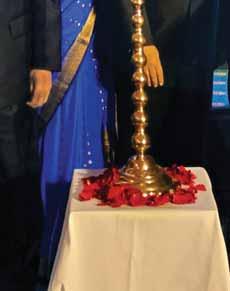
have so many achievements to your credit. As your serving director, I compliment and congratulate all the club members on behalf of the RI Board.”
Wherever he goes, Rotarians ask him what Rotary wants from them. “My reply is — cleaner minds and dirtier fingernails. We need to set an example by practising integrity in what we say and do. I do not stress on ethics because ethics may change from century to century, but integrity in thoughts, action and deeds is timeless.”
He urged all Rotarians to think of integrity in their “clubs, service, administration and elections at the district, zone and international levels. At the risk of repetition, I say the only thing that walks back from



the graveyard with the mourners is a man’s character. It outlives the man.”
Undoubtedly, the club’s past has been splendid; “we take pride in the past but it is time to move into the future. The torch of leadership is in the hands of Purnendu Roy Choudhury. I urge you to hold that torch a little higher, make it burn a little brighter and pass it on to future generations.”
Pandya said all rivers have a humble beginning; “as it flows down the mountain, other small streams join a river and by the time it comes to the plains, it swells into a mighty river. It is the same with Rotary. A hundred


We take pride in the past but it is time to move into the future.
The torch of leadership is in Purnendu Roy Choudhury’s hand. I urge you to hold that torch a little higher, make it burn a little brighter and pass it on to future generations.
years ago, the world was undergoing tremendous changes. World War I had ended, the first plastic surgery was done, and so many changes were happening, and in this corner of India, a fledgling Rotary club was born. As the Chinese proverb goes, a journey of 1,000 miles begins with a small step. RC Calcutta also began its journey with that step in Jan 1920.”
And as the journey progressed, “other outstanding men, and then women, joined it and their thoughts, ideas and inputs came in and today this club is a leading club not only in RID 3291, but all of India, if not entire South Asia.”
The journey would have been a roller coaster, with many highs, some lows, challenges, “but at the end of it all, it has been an enjoyable, satisfying, enriching journey… a journey of service above self.”
The RI Director added: “If you ask me to describe Rotary in two words, I’d say they are “hope and opportunity; hope that the community has in Rotary that it will do something to improve the community and make the world a little better. And the opportunity that you and I get to fulfill that hope to make our world a little better place.”
Rotary had achieved a lot in the last century, not the least of which
was coming so close to eradicating polio from the world. But yet, it faced four challenges — could it remain relevant to our times; could it ensure continuity of programmes and projects (“not doing this gives us the image of a touch-and-go organisation”); greater focus and partnerships.
Congratulating the club on completing 100 years of its charter, PRIP Rajendra Saboo said he had a complaint against “the man who never visited RC Calcutta”, and that was Rotary Founder Paul Harris. Addressing him, he added: “With due respect, you have made a mess of all of us here. Because normal people, who otherwise would be pursuing their business or profession, are all here… from the UK, Australia and other parts of the world, spending their money and talking about fellowship, service, etc. We were chasing happiness that we get from our work, business, making money and spending our time with our families. But look what we are doing here! But we still thank you in total sincerity because you sowed that seed in our hearts that we don’t live for ourselves but people who need us.”
Recounting a little history of the club, Saboo recalled how initially there was difficulty in getting 45










Clockwise: RID Bharat Pandya adorns PDG Nandy’s lapel with a centennial pin; PRIP Rajendra Saboo with RC Calcutta’s first president Vinay Nevatia; US Consul General to Kolkata Patti Hoffman (R) and Rtn David Palmer with foreign delegates; (From L): Saumen Ray, Rtn Palmer, PDG Nandy and PP Ritwik Gupta; Saumen Ray greets the US Consul General Patti Hoffman in the presence of Club President Choudhury and Secretary Anusua Das.
people together to form RC Calcutta. The club bulletin Chaka was started in 1925 and continues to have its pioneering status. “This club is privileged to have Sir Surendranath Banerjee as its member and to get addressed by Mahatma Gandhi. So many important persons in Kolkata were either its members
or have addressed it. And of course, you had Nitish Laharry as your first Indian club secretary.”
Saboo disclosed that his late father was also a member of RC Calcutta, even though he was not a regular attendee of the club meetings thanks to his hectic travel. “But I first heard the name Rotary from him and what it stood for. In our household, he talked of Rotary and I once asked him why don’t you attend their meetings, and he said they have been kind enough to give me leave of absence every time!”
When he shifted from Kolkata to Chandigarh in 1960, and was invited to join Rotary, he already had a connect with the organisation. “And I was privileged also to come here as the RI president, and am happy to be here when the fourth president of RI from India — Shekhar Mehta — will be taking over and he is the son of Kolkata too!”
In a video message RI President Mark Maloney congratulated the club on its centennial. “It has such a distinguished history; when organised on Sep 26, 1919, it was the only Rotary club between the English Channel and the China Sea. And it is a Rotary club with the longest continuous existence in Asia. It is also responsible for the organisation of Rotary clubs in Lahore, Bombay, Madras, Delhi and Dhaka. I, along with Gay, look forward to






celebrating with you in person in February,” he added.
David Palmer from RI District 1130, who has been instrumental in RC Calcutta forging some meaningful partnerships with clubs in that district and elsewhere in the UK, regaled the audience with his great sense of humour. He began his speech by saying that one of the Rotarians in the room — “you know who you are” — had posted a picture of “me in very close proximity with a Russian belly dancer last night (New Year’s night where a grand celebration was held).” This had resulted in his daughter calling and asking: “What are you doing in Russia… we thought you were in India for a Rotary event!”
Recalling his meeting with past president of the club and Centennial Committee Chair Saumen Ray, he said,

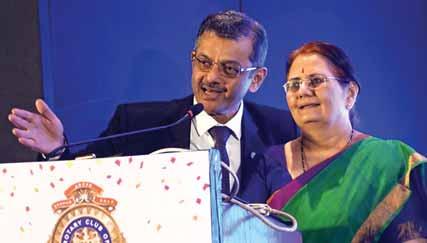



The event was attended by numerous foreign delegates from the UK, US, Australia, Egypt, Bangladesh and other countries. But the predominant presence was from the Rotary clubs in Scotland, RI District 1130, with which RC Calcutta has a strong partnership for doing community service projects over long years. It was organised in the plush banquet hall of Hotel Grand in Kolkata, where vintage and senior members of the club have several nostalgic memories as the club held its meeting at this venue for over 40 years. But once the Rotary Sadan was
“a combination of good luck and chance meeting with Ray” had resulted in his district forging a great partnership with RC Calcutta. He recalled how they had first set up a meeting “at the Paddington railway station (in London) and like a pack of cold war spies we decided he should wear a carnation or rose in his pocket and I would hold up a newspaper in my hand. Now Saumen being
built by RC Calcutta, its meetings have shifted to that venue.
“But many senior members often express their longing for a return to this hotel; forget the food, which is delicious, nobody in Kolkata can make biscuits and pastries like the Grand Hotel,” said a senior member.
There was a different kind of nostalgia too, as the speakers and senior Rotary leaders recalled the hoary past of the club. This included Mahatma Gandhi addressing the club in 1920, when all the members of the club were white males, on the importance of the charkha. In his honour, only
who he is, completely misunderstood this and was last seen walking around Paddington station which is frequented by a certain type of persons in London, not wearing but waving his rose, not a wise thing to do at the Paddington station! I did recognise him and saved him from the embarrassment that could have followed and even a brush with the constabulary!”


vegetarian food was served at that meeting, and one can visualise the twinkle in the Mahatma’s eyes when he remarked: “Today the Rotarians are having a Bengali widow’s luncheon!”
There was of course a lot of mention and recall with pride of how the first Indian to become an RI President — Nitish Laharry — joined their club in early 1926 and went on to become the first Indian secretary of the club in 1926–27, “though at that time he was a quiet and even a shy young man,” says the club’s histroy book. But more of Laharry in the next issue!
They chatted for a while “and I was astonished to learn of the sheer volume of Foundation work undertaken by the Rotarians of just one club in Calcutta.”
So he talked about their work in his district; “the results were immediate, many of the clubs showed positive interest in linking with him.” More recently, when he was the chair of his district conference, he invited Ray to “address us on how an open approach to TRF and its funding could give such dramatic results. The impact of his talk was incredible on the district members.” Ray asked for his help to design the Centennial bell. This bell has been sponsored by PDG Prabhat Krishna Rohatgi.
Delivering a talk on WinS, PDG Ravi Sehgal related an interesting story of how partnerships for service projects are formed. About 20 years ago, a GSE team of Rotarians from Georgia visited a project being done by RID 3291. After inaugurating a tube
well, “while walking back, they saw a long queue of children standing in the sun and eating from their tiffin boxes.” It naturally raised a question, and so “we went inside the school and asked, and found there was only one tube well for 600 children in the entire school. And by the time they finished their tiffin, many of the children didn’t have time to drink water. So when they got their turn, they would just take a sip of water, whether they had finished their food or not. That’s all they got. There were tears in the eyes of the GSE team leader, who told me that in the US they took everything for granted. You put the switch on and get electricity; turn the tap on, water comes. It is sad to see this state of affairs.”
Unfortunately, such a situation existed in many schools even today. Over 110 million school children are getting midday meals from the government, but they don’t have proper drinking water facilities. Five years ago, Rotary took up the challenge
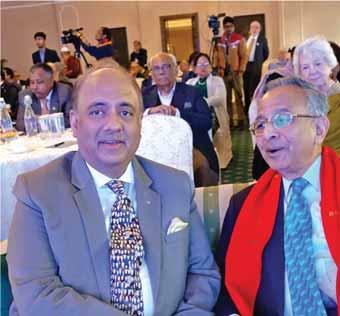





and was working along with the GoI to improve/provide handwashing and toilet facilities in schools.
Saumen Ray conducted the meeting and regaled the audience with several anecdotes from the past. Club President Purnendu Roy Choudhury said during its centennial the club had plans to do projects worth ` 20 crore. Earlier in the day it had given a camera worth ` 25 lakh to a local hospital which would help prevent blindness in premature babies. A special cover was released by the postal department on the occasion. RIPN Shekhar Mehta, DG Ajay Agarwal, and US Consul General in Kolkata Patti Hoffman felicitated the club members.
Pictures by Rasheeda Bhagat
Designed by N Krishnamurthy


Rotary International President-elect Holger Knaack is encouraging Rotarians to seize the many opportunities Rotary offers to enrich their lives and the communities they serve.
Knaack, a member of RC Herzogtum Lauenburg-Mölln, Germany, revealed the 2020–21 presidential theme, Rotary Opens Opportunities, to incoming district governors at the Rotary International Assembly in San Diego, California, USA, on Jan 20.
Rotary isn’t just a club for people to join, but rather “an invitation to endless opportunities,” said Knaack, who becomes its president on July 1. He emphasised that Rotary creates pathways for members to improve their lives and the lives of those they help through service projects.

“We believe that our acts of service, big and small, create opportunities for people who need our help,” Knaack said. He added that Rotary creates leadership opportunities and gives members the chance to travel the world to put their service ideas into action and make lifelong connections.
“Everything we do opens another opportunity for someone, somewhere,” said Knaack.
Knaack also urged members to embrace change so Rotary can expand and thrive. Rather than setting a specific target for increasing the number of members, Knaack said he’s asking clubs and districts to think about how to grow in a sustainable and organic way. He wants clubs to focus on keeping current members engaged and adding new members who are the right fit for their club.
“We need to stop thinking of new members as people we can mark down as statistics and then forget about,” Knaack said. “Every new member changes us a little bit. That person brings a new perspective, new experiences. We need to embrace this constant renewal. We will grow stronger as we learn from new members.”
Knaack pointed to Rotary’s Action Plan as a compass that can guide clubs as they evolve. He recommended that every club have a strategic plan meeting at least once a year. At that meeting, clubs


We need to stop thinking of new members as people we can mark down as statistics and then forget about.
Holger Knaack RI President-elect
should ask where they want to be in five years and how they can bring more value to their members.
Knaack also wants to see more women in leadership roles and see Rotaractors play an integral role in how new clubs are formed and run. He encouraged district leaders to create new club models and rethink what it means to be in Rotary, and allow young people to be the architects of these new clubs.
“We have to be open to new approaches, and creating unique clubs for younger people is just part of the solution,” said Knaack. “Let Rotaractors decide what kind of Rotary experience works best for them. These young people are bright, energetic, and they get things done.”

In stressing the need for Rotary members to embrace change, Knaack noted that time won’t slow down for Rotary: “We will not let rapid change defeat us. We will capture this moment to grow Rotary, making it stronger, more adaptable, and even more aligned with our core values.”
© rotary.org

Rasheeda Bhagat


The success of the literacy projects done by Rotarians in India — be it setting up happy schools, training teachers or spreading e-Learning, “has shown us how much we can achieve if we put our hearts and minds, and passion, into the work we do,” said RIPN Shekhar Mehta, addressing a felicitation event in Chennai organised by RI District 3232.
“This gives me a new thought; that Rotary should do projects which are 10 per cent of what the government can do. I am aware of what I am saying; already we are doing more than 30
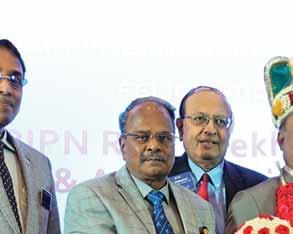
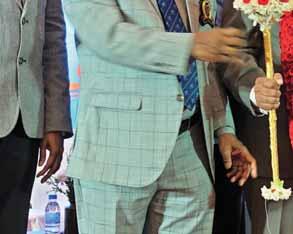

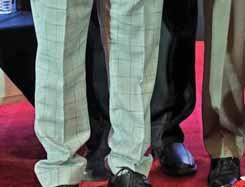


per cent in the E-learning area. So if the GoI is putting up one crore toilets, then we should do 10 lakh, and that is possible. My own club, (RC Calcutta Mahanagar), one singe club, is putting up 10,000 rural toilets.”
If the GoI has a target of creating 100,000 check dams, “let’s do 10,000. If you divide the number by 40 districts, we can do it. How many organisations have the courage to say we will do 10 per cent of your job?” He added that earlier that day he had visited a wonderful lake restoration project done by RC Madras, as well as a happy school, an exemplary project too.
Urging Rotarians to do bigger and bolder projects, he said that once Rotary starts doing this, there won’t be any problem in the government accepting Rotary as a preferred partner in various service areas. Apart from the government, Rotarians should also start looking at other partners; for instance, the Literacy team had struck a big partnership with the Brahmakumaris; “there is huge strength in partnerships,” he added.
“The needs in our country are so huge… I have learnt that when you set high goals and people laugh at you, you are on the right path. Jis jis pe

From L: DG G Chandramohan and his wife Manjula felicitating RIPN Shekhar Mehta and Rashi in the presence of (from L) PDG ISAK Nazar, DGE S Muthupalaniappan, PRID P T Prabhakar, RIDN A S Venkatesh, DGN J Sridhar, AG Balasubramanian and Club Service Director Dr Shankaran.


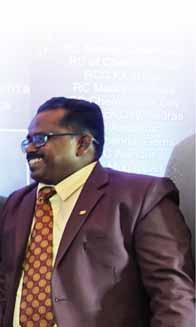

If the government is putting up one crore toilets, then we should do 10 lakh, and that is possible.
yeh jag hasa hei, itihas usi ne racha hei (It has been proved that history has been created by those who have been laughed at and ridiculed). Urging them to dare to dream big, Mehta asked the gathered Rotarians to just imagine the courage of the man who had got up and said 30 years ago that we will eradicate polio. Of course, Rotary hadn’t worked alone in eradicating polio from most of the world, it had come so far along with great partners. And Rotarians and Rotary clubs had also done thousands of eye surgeries, built a large number of toilets, restored water bodies…. “all this, because we Rotarians think from the heart.”
But they also had an amazing network, talent and skills; “add to that the fact that each of you sitting here is a leader in your community… a leading doctor, lawyer, chartered accountant or businessman… in our zones we have 1.5 lakh Rotary families. We are leaders in our society and we are 100 years old, so we cannot do small things. But make your programmes structured, such as Literacy is, and with a certain uniformity and standards, and you can achieve whatever you dare to dream.”
Congratulating the senior leaders of RID 3232, Mehta said, “This is an excellent district… in the last 5–7 years you have doubled your
membership” and even in TRF giving, it had been giving over $1 million for the last several years. “Add to this the outstanding service projects you do, as I could see from the two projects of RC Madras that I visited this morning, and you are right there at the top.”
Thanking PDG ISAK Nazar who had put together the event, and DG G Chandramohan, Mehta said he was overwhelmed by the “love and affection” the Rotarians of RID 3232 had showered on Rashi and him, “which is evident from this hall which is overflowing on a Thursday afternoon at 4 p.m. What hospitality you have shown, as other Rotarians all over India had done too. We can in no way pay back the love and affection that is being showered on us. But at the same time, the moment you do this, it places extra responsibility on me.”
He added that the day he was nominated RI Director, “I felt I am not worthy of it, but will have to become worthy. So that night I wrote down what I need to do to become worthy of all the good things that were being said about me.” He was doing the same now, so that he can at least make an attempt to get nearer to the description of himself at these events!
RI
have learnt that when you set high goals and people laugh at you, you are on the right path.

ecalling his long association with Mehta, RIDN A S Venkatesh, who is from RID 3232, said that when the Literacy programme was conceived “nine years ago, for almost two years, every week, I was in Kolkata… I am not joking. In the initial days itself it became evident that he is a tough taskmaster. The beauty of working with him is that he sets almost impossible targets, gets you to believe they can be achieved, and then guides you to achieve them. That is the kind of leadership he provides.”
Mehta was a very hardworking person, and Venkatesh got a taste of it one night when his phone rang at 1.45 a.m. “It was Shekhar, and he says: ‘Venky, are you sleeping?”


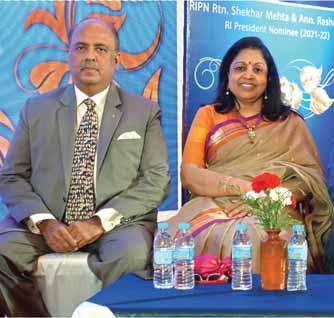

But “when you work with him, you find that he thinks large, sees how far you can go and then ensures that you go that far.” But much more important than his hardworking side was the personal care he and Rashi gave to those who worked closely with him. On every visit to Kolkata there would be food sent from Mehta’s home for all of them; “both of them make you feel like a part of their family.”
And when flights were late and the lunch hour was missed, packed masala dosais were there to greet him, he added. “Now of course he has become a leader of the world and the Rotary world is lucky to have him as
The beauty of working with him is that he sets almost impossible targets, gets you to believe they can be achieved, and then guides you to achieve them. That is the kind of leadership he provides.”
RIDN A S Venkatesh
their leader. I am doubly fortunate that I will be serving on the RI Board with him.” Then, injecting wee bit of sarcasm he added “I’m sure I will have a very comfortable time serving as a Director on the Board under him.”
Congratulating Mehta, PRID P T Prabhakar, who was on the RIPN nomination committee, recalled how the competition Mehta had faced was really tough, the last four shortlisted for the RI President’s role “were all world class, brilliant leaders, but Mehta took the cake; his answers at the interview were the best. He said I expect Rotary to get the Nobel prize, even before we make the world totally polio-free, because look what we have achieved in the last 30 years in eradicating polio from most of the world.”
DG Chandramohan gave a quick recap of the major projects done by District 3232, including the ‘pink auto’ project that is making waves, as it is empowering women by giving them livelihood through owning and driving
their own three wheelers. In all, the project aims to benefit 200 women.
Describing another ambitious project he has launched, the DG said he has requested each Rotarian of the district to donate 2 dollars, and then approach 100 of their family members, friends, clients, etc to each give another 2 dollars. “By the end of this Rotary year, as we have 5,000 Rotarians, we hope to collect $1 million and present it to you (Mehta) so that it can be given to TRF.” This money would then be grown through the TRF, and with global grants a higher amount would be used to do better and larger community projects, he promised the RIPN.
Chandramohan got a commitment from all the assembled DGs that they would make this a successful scheme to collect funds for TRF.
PDG Nazar welcomed the gathering and said that it was his leadership skills and immense hard work that had reached Mehta to the topmost position in Rotary.
DGE S Muthupalaniappan congratulated the RIPN, who was then felicitated in a traditional way.
Pictures by Rasheeda Bhagat
V Muthukumaran
Our communities face huge problems and the service projects we do seem to be too little to make significant impacts, said RIPN Shekhar Mehta at the launch of Project Vidiyal, a financial assistance scheme of RC Madras North, RID 3232, for needy girls to pursue college education.
He urged Rotarians to think big, set their targets high and raise funds through events to take up meaningful projects. He complimented the 50-yearold club, the fourth largest in Chennai, for taking up this project which would fund the college education of 10 girls to begin with, but said, “next year the







DG G Chandramohan,
and DGND Dr Nandakumar.
target should be 100 beneficiaries, that is, 10 times more, which is definitely possible.” He cited how his home club, RC Calcutta Mahanagar, had sponsored the school education of around 150 children and will be increasing it to 250 beneficiaries next year.
Mehta presented the charter to a new club, RC Chennai Legends, to its president V Elanchezhian. Twenty-five members of RC Chennai Legends were also inducted at the event. “Make full use of the opportunity that your club provides by reaching out to the community and doing big projects,” he advised the new members. Charter President Elanchezhian said that he would strive to increase the club membership to at least 40 by the year-end.
Citing an event hosted by his district club in Kolkata that had thought leader Robin Sharma as guest speaker, Mehta said each ticket cost `5,000 and the programme was a show stealer drawing huge invitees, besides raising large funds for the club’s projects. He urged PDG G Olivannan, the club advisor, to
hold similar programmes by inviting eminent people to speak which would enable clubs to raise funds. As a newbie in Rotary decades ago, he chaired a souvenir project which netted `1.5 lakh and that was the starting point of the exciting journey so far.
DG G Chandramohan said Mehta was the “right person to launch Project Vidiyal for he had steered RILM which aims to usher in total literacy in India.” The governor said RID 3232 has set a target of $1 million for TRF giving and 1,000 new members in this Rotary year.
Earlier, Club President M Ganapathi recalled the words of Mahatma Gandhi who laid emphasis on women’s education for progress of society. The club was able to establish a corpus of ` 1 crore through a fundraiser, thanks to Project Chairman N Venkatesh, he said.
A cheque for `2 lakh was presented to Anandham Foundation, an NGO, with which the club inked an MoU to
implement Project Vidiyal. “We have chosen this NGO which has proven expertise in educating over 500 girl children across Tamil Nadu. We conducted a Musical Nite last year to raise the corpus of `1 crore for the project. The interest from this amount will be used to take care of the annual expenses of Project Vidiyal,” said Anand Saravana Raj, Joint Secretary of the club.
District Chair for Membership B Dakshayini said RID 3232 would have eight new clubs for the year ending June 30, of which two have been formed so far. While compering the event, PDG Olivannan recalled the genesis of the project mentored by its Chairman N Venkatesh during his tenure as club president. PRID P T Prabhakar, PDGs Abhirami Ramanathan (RID 3231), P Gopalakrishnan (RID 3000), John Daniel (RID 3211), DGE S Muthupalaniappan, DGND Dr Nandakumar (RID 3232) and RPIC Rajadurai Michael were present at the launch event.
Pictures by V Muthukumaran

















My dream is to focus on building Brand Rotary, so that we pull people to Rotary rather than push Rotary to people. Let’s build our brand in such a fashion that people should be enthused to join us… wait in a queue and say will you take me into
Rotary,” said RI Director Nominee A S Venkatesh in a felicitation event held in Chennai representing several districts.
Referring to RIPN Shekhar Mehta’s dream, spelt out earlier in the event, that Indian Rotary should have three lakh members, he said this could
happen when membership responsibility did not remain with the club president or officers but was broad-based and tackled in a scientific manner.
“This is where most of the problems come. They will get only their friends and those Rotarians will leave when their tenure ends.”
RIPN Shekhar Mehta felicitating RIDN A S Venkatesh and his wife Vinita in the presence of TRF

Trustee Gulam Vahanvaty, Trustee Chair-elect K R Ravindran, District Secretary Ganapathy Suresh, DG G Chandramohan and DGE S Muthupalaniappan.
Trustee Gulam Trustee Chair-elect K R Ravindran, District Suresh, DG G Chandramohan and DGE S Muthupalaniappan




And once new members join, “there should be a proper orientation course for them just as it happens in the corporate world. If that happens we will have a stronger base.”
Revealing a startling bit of statistic, he said he had analysed membership data over the last five years for Zone 5 and found that “over the last seven years, we have lost as many members as we have now. This means that had nobody left Rotary in the last seven years, our membership in Zone 5 would have been double.”
Interpolating this data to the rest of our districts, if no Rotarian had left in the last seven years, Rotary’s membership in India would have been



At the felicitation event, most of the speakers spoke about Vinita’s accomplishments as a corporate honcho in her own right. Also a graduate from IIM, Ahmedabad, where she met her husband, she was bound to be an excellent asset to Venkatesh, who would do well to listen to her views and counsel, advised all the senior leaders.
PRID Basker recalled that at a recent event, PRID Manoj Desai had shared the secret
behind Shekhar Mehta getting the RI President’s nomination at first shot: taking Rashi with him for the interview to Evanston.
For the first time this year, the candidates for the RI Director’s position were invited by the nominating committee for an interview. “I asked Venkatesh, did you go with Vinita for that interview, and he said ‘Yes’. He followed Shekhar’s lead. So at any crucial time, ensure that your partner is there to get success.”
over three lakh. But worse than losing members was that “we are also generating bad brand ambassadors in society. Those who leave are going to talk about the not so good side of Rotary; so let’s avoid bad brand ambassadors,” Venkatesh added.
Urging all Rotarians to work in a manner that will make Rotary “the NGO of choice either for membership
or donations”, he said: “If I can pay the school fees of five and another person is doing the same, when both of us join Rotary, we shouldn’t continue to do the same, which could have been done from outside as well. We should be building a school. That should be the power of Rotary, where one plus one shouldn’t be two but 11.”
Stressing the need to “leverage the power of collective charity”, he said, “Let’s focus on building a larger scale of activity in such a way that we have a brand which is recognised

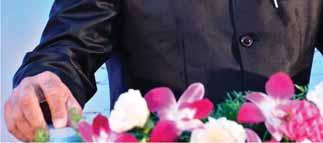

Below: From L: PDG I S A K Nazar, PRID C Basker, Trustee Vahanvaty, Trustee Chair-elect Ravindran, PRID P T Prabhakar, RIPN Mehta, RIDN Venkatesh, Vinita, DG Chandramohan, DGE Muthupalaniappan, DGN Sridhar, DGND Dr Nandakumar, AG Balasubramanian, Club Service Director Dr Shankaran and District Secretary Ganapathy Suresh.
and sought after. All of us do that in our businesses, building both our brands and markets. Let’s do it for Rotary too.”
While his focus would be on doing all this during his two-year in office as director, he clarified that he regarded his position as neither one of authority or responsibility. “It’s a position of opportunity to make a difference. Nobody is going to question if I don’t do anything; I’ll still be a past director in 2023. It’s not what people expect from me but what I expect from myself. I have an opportunity to make a difference. This is neither the beginning nor the end, it’s a journey. I request all of you to please travel with me in this journey, let us enjoy it together and reach the destination we have set out for.”
Felicitating Venkatesh, RIPN Shekhar Mehta said, “India has chosen one of the most qualified persons for the job of an RI Director; Venky is a



smart guy, intelligent, very well read; you can’t have a better combination than IIM and IIT. He has a spouse in Vinita who is also from IIMA. He is a sharp, intelligent, thinking man and I always believe on a board of directors you don’t need people who work very hard. You need people who think very hard.”
In any endeavour, it was thinking that was very important, and “I have watched from close quarters Venky doing just this, and I’ve benefitted from it. Everybody gives me the credit for TEACH, yes a lot of it is due to me, but one person I would share that credit with tremendously is this man.”

He disclosed that when he started working on literacy, he badly “needed a sounding board; somebody who wouldn’t say ‘Yes’ to me, had his own opinion and would be smart and I found that person in Venky. There wasn’t a day when we were not on telephone calls. Anything I wanted to discuss, he had the right answer for it.”
Mehta added that Vinita, “who has her own corporate identity, will play a very crucial role in this journey, and will give you very meaningful inputs which will be of great help in interacting with other Board members.”
He considered himself “very fortunate” to get Venkatesh serving him on the RI Board in 2021–22, as “we have worked closely together for six years, and have a certain wavelength.” Rotary in India, he reiterated, is “the Kohinoor in the Rotary crown; be it membership, TRF contribution or projects, our work and contribution have been outstanding.”
Mehta added that no other country does projects like Rotarians in our
zones do, and estimated that Indian Rotarians use barely 12 per cent of TRF funds for their projects. He told the new RIDN: “We are at the best of times and on a springboard, poised to take off, and you will play a major role as you will be there for two years, while I will be there only for one year, and you can change and mould the way Rotary functions in India.”
In a video message PRIP Rajendra Saboo described Venkatesh as an “outstanding Rotarian”, and expressed confidence that in the RI Board, “using his knowledge, experience and wisdom, he will bring glory to himself, India and Rotary”.
PRIP K R Ravindran said Venkatesh had all the qualities required of an RI director. “He has sound subject
Let’s build our brand in such a fashion that people should be enthused to join us.
A S Venkatesh RI Director Nominee
knowledge, impeccable honesty and integrity, unwavering commitment, unmitigated passion for the job, tons of enthusiasm and energy and an agile mind and intellect to do the job well.”
But above all that, he added, “he has Vinita… who in her own right is an extremely successful executive, extraordinarily talented, widely travelled, and holding an office in the shipping industry.”

Venkatesh had “all the ingredients and potential to be a great leader; I have no doubt he will be a winner on the RI Board.” Urging him to focus on the organisation first, second, and last, he said “This is easier said than done. We come from an area where there are lots of pulls and pressures. He will be called to make many sacrifices, will have to employ a disciplined will and tread the middle path and make decisions which won’t exactly take him to the top of the popularity charts.”
The RIDN had the capability to do all this, “but he will lead best if he forgets himself and focuses only on the group and the organisation. Leading is not new to Venky, who has held many leadership roles within and outside Rotary.”
Ravindran added that Venkatesh would be joining a very special RI Board... a Board where there will be as


Responding to the felicitations offered to him at the first event organised in Chennai, RI Director Nominee
A S Venkatesh said that unlike RIPN Shekhar Mehta, he couldn’t quote Gulzar or Ghalib, and drew upon Thiruvalluvar to quote a couplet: “There is no salvation for someone who forgets those who have helped him.”
Spelling out the support different people had given him over the years “to reach where I am,” he thanked his club president (“Umesh, my boss”) and other members from RC Chennai Mambalam who had tolerated him through his dwindling attendance over the years. It used to be “100 per cent” in the earlier years but started falling post his stint as DG.
He next thanked “various governors from the district, who had faith and trust in me to give me opportunities. You may have the skills but somebody has to give you the opportunity.”
The first man to do so was PDG Benjamin Cherian “who
many as eight women! But that board also would have “a very good charioteer in Shekhar Mehta.”
Felicitating Venkatesh, TRF Trustee Gulam Vahanvaty recalled that as the training leader of Venkatesh’s batch of DGEs at the IA, “I built a great rapport with Venky and Vinita, also because they were from IIMA and I am from IIM Kolkata. He has
first trusted me with a major responsibility two years after my club presidentship by asking me to be the PETS and conference chair.”
Beyond the district-level it was PRIP K R Ravindran, who as RI Director, chose him as a Rotary coordinator. Initially “really scared to work with him, as he is known to be a no-nonsense man, now I don’t fear him that much,” smiled Venkatesh. He did set tough targets and asked tough questions “but he had faith in me and guided me through the year. Now of course Vanathy and he are like family members to us.”
He had learnt from Ravindran that a corporate style of governance can be effectively applied to Rotary, as well as how to disagree with a person without hating him or developing any enmity.
His first exposure to a senior leader beyond the district was Trustee Vahanvaty who was his training leader in San Diego; “both Vinita and I had a wonderful and stress-free time with Haseena (his late wife) and him. He is a perfect gentleman, and will score 110 on 100.”
tremendous drive and energy, and I will have the privilege of working both with Mehta (RI President) and Venkatesh in 2022-23, which will be my last year as Trustee.”
Congratulating Venkatesh, PRID C Basker said that during the last 10 years “Indian Rotary has completely transformed; whether it is membership or TRF contributions, or doing large projects, our performance is being applauded.”
There were some issues bothering Rotary in India but these will be
From PRID P T Prabhakar he had learnt a lot. “He has a neversay-die attitude; if he sets his eye on some goals, he will reach them come what may.” From PRID C Basker, “who should be called the boss as he is a born leader”, he learnt to always remain calm in the face of problems and challenges and solve them confidently.
With Mehta he had worked for some eight years when the telephone conversations took place always after midnight. The first few times he held them on the speaker lest “Vinita thought otherwise, and finally she’d say ‘it must be Shekhar, please talk from the other room and let me sleep.”
From him “I learnt that however a gifted person one might be, it requires hard work to take you to that last mile. He is extremely gifted, talented and knowledgeable but the hard work he puts in distinguishes him from others. To my knowledge he works 18 hours a day.”
addressed he said. He urged the newly nominated RIDN to ensure that he reversed the focus that had shifted from Rotary clubs to the district. Most DGs were focusing on the district and prioritising district goals. But it was the Rotary club which was the member of RI, and the clubs had been formed to address concerns of the community. “I worked with two sets of DGs and kept telling them to focus on the clubs and not the districts, as the districts have been formed to support the clubs and their priority should be to make the


From L: PRID C Basker, DGE Muthupalaniappan, RIPN Mehta, District Secretary Ganapathy Suresh and DG Chandramohan.
clubs vibrant. Under your leadership, I am confident that the clubs will get maximum focus, and with your experience and knowledge your term will be a glorious one.”
Addressing the meeting, PRID P T Prabhakar said, “Success is all about winning over others and making them happy. If the number of people in this hall, which includes so many present and past RI officers from all over India, is an index of your popularity,
then it is evident that you have brought a lot of cheer to so many.”
Congratulating Venkatesh, he added, “You have the potential to take Rotary in India to its greatest ever future.”
VThose who leave are going to talk about the not so good side of Rotary; so let’s avoid bad brand ambassadors.
arsha and Varuna, Venkatesh and Vinita’s daughters, who couldn’t attend the event, talked about their parents’ passion for Rotary over the years in a video message. They had watched from a young age their father’s passion for Rotary as a member of RC Chennai Mambalam. Said one of them: “The best part of his growth in Rotary was his frequent trips to Chicago because we could accompany him there. Through all of this, our mother has been by his side providing strength, support and her insightful perspective. We have no doubts you will achieve
great heights, Appa! We can’t wait to see the difference you will make.”
Felicitating the RIDN, RID 3232 DG G Chandramohan said, “I have been observing him for a long time and his elevation to this position proves that to be successful you shouldn’t do what 99 per cent of people do. Venky has his unique style of doing things, and 127 presidents of our district (3232) wish you great success.”
DGE S Muthupalaniappan said Venkatesh was not only “friendly and approachable, he can also talk on any Rotary topic with great clarity and authority. He knows the knack of managing people, and is an accomplished stage actor too. He is passionate about empowerment of the girl child.”
Chairman of the event PDG ISAK Nazar congratulated Venkatesh for his nomination as RIDN and said he made both the district (3232) and India proud. DGN J Sridhar delivered a vote of thanks.
Itwas three days of fun, excitement and games for the 124 differently-abled children at the RYLA Vishesh 2019 hosted by RC Chandigarh Midtown, RID 3080. “The main aim of this event was to bring out the personal and leadership qualities of the special kids through fun activities,” said Salil Dev Singh Bali, Club President.
The event was inaugurated by the Punjab’s Minister of Social Security, Women and Child Development Aruna Chaudhary. She complimented the club for its efforts in putting together an exclusive RYLA for special children. The training-cum-fun programmes included a series of exciting activities for


Athe participants. Yoga, sports, indoor games, dance and many such programmes gave the adrenaline rush for children.
“One of the sessions that was enjoyed thoroughly by the participants was the art therapy workshop conducted by Charu Gupta, an artist,” said
Bali. To encourage the participants, awards and certificates were given to the best performers while all the children were given RYLA certificates.
At the event
PRIP Rajendra Saboo handed over wheelchairs, a tricycle and a sewing machine to
a few physically and mentally-challenged students. Ritu Dhingra, spouse of DG Jitendra Dhingra, said that `70,000 will be given to the club to part-fund this annual event. Later, a cricket match was organised for the special children, followed by a bonfire.
two-day medical camp was organised recently by RC Delhi Southex, RID 3011, at Kotla in

Delhi. Around 1,800 people from the surrounding regions benefitted from the camp. Medical screenings were done for various parameters such as ophthalmology, dental, dermatology, gynaecology, cardiac, TB, bone density, thyroid and cancer.
The Rotarians distributed
1,000 packs of sanitary napkins and 500 hand sanitisers to promote hygiene practices among the people. Besides, 800 people were given spectacles at the camp.
DG Suresh Bhasin with his spouse Ritu, DGE Sanjiv Rai Mehra, DGN Anup Mittal and other district office-bearers visited the camp.
The club’s elaborate publicity campaign hugely helped in achieving this large registration, said the Club Secretary Madhuukar Khemka.
RIPN Shekhar Mehta and Rashi, RID Kamal Sanghvi and Sonal, RID Bharat Pandya and Madhavi with the Indian contingent at the International Assembly.









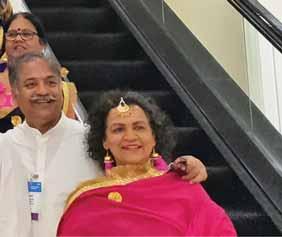







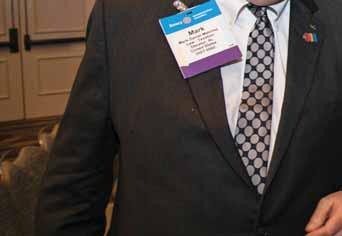









Clockwise from above:
DGE S Muthupalaniappan and his wife Kamala with RIPN Mehta, Rashi, RI General Secretary John Hewko and his wife Margarita;
From R: DGEs Manish Sharda, Davinder Singh and his wife Dolly;
From L: Madhavi, Sonal, Gay Maloney, TRF Trustee Gulam Vahanvaty and RID Pandya; Sonal Sanghvi and Mahalakshmi, wife of DGE Chinnapa Reddy.

















From L: RIDE Roger Lhors; TRF Trustee Jennifer Jones’s spouse Nick Krayacich; PRIP John Germ; TRF Trustee Jennifer Jones; Director, Polio Eradication, WHO, Michel Zaffran; RIPE Holger Knaack; RI PolioPlus Director Carol Pandak; IPPC Chair Mike McGovern; and Trustee Chair-elect K R Ravindran celebrate the announcement that Rotary and the Gates Foundation will extend their fundraising partnership to eradicate polio.





DRRs Manuj Mittal (RID 3011) and Senthil Mani (RID 3232).

K
TRF Trustee Chairelect K R Ravindran talked about the Foundation’s new programmes and priorities to the governors-elect at the International Assembly. A new grant scheme, Programmes of Scale, will be rolled out next year. “These grants will challenge Rotary clubs to think big and approach co-partners and sponsors to join them in comprehensive solutions to major issues, the benefits of which reach a large population.”
Explaining it further, he cited the cervical cancer vaccination project, the only cancer that is vaccinepreventable. The programme involves vaccinating every girl in 8–10 age and screening every woman in age 35–45. “Then you can in theory eradicate cervical cancer.” But no one organisation can do it alone and it needs the support of multiple agencies. The Programmes of Scale grants will support projects of such scale with a single $2 million grant every year.
Talking about priorities, Ravindran reiterated that
the first priority is of course to end polio. “We have already reduced the number of polio cases by 99.9 per cent. We are down to only two countries with the wild poliovirus — Pakistan and Afghanistan. We will finish the job,” he said.
The second priority is to increase the Annual Fund and PolioPlus while building the Endowment Fund to $2.025 billion by 2025. The comprehensive fundraising goal for the next year is $410 million. He pointed out that nearly 20 per cent of the clubs do not contribute to the Foundation’s Annual Fund. “We need to hit our goals if we are to fund the ever-increasing demand for our global grants, which enable our clubs to change lives,” he said.
The next priority is to improve the measurable impact of the grants. “We need to create projects that do more than make us feel good. Our projects must change lives. This is not just about dollars. This is about lives.”
Ravindran recounted how a maternity hospital


that was built by his club with TRF support in Sri Lanka has been a big boon for expectant mothers and newborn babies.
He had accompanied then Foundation Chair D K Lee to the hospital during Lee’s visit to Sri Lanka. As they went around the neonatal ICU, he saw a tiny baby which could fit in both his palms, with tubes running all over its body, and fighting for her every breath. The sight made him say instinctively: ‘Fight, baby fight.’ “She was poor, she was sick, but she was not forgotten. She would not be left to die. She was someone’s precious child, and we had cared for her. We had done all we could to give her that chance to live, because of the power of our Foundation.”

And two years later, when he visited the same hospital, he was told that 140,000 babies had been born there since Rotary built it. He was introduced to a young mother with a child. He reached out and carried the child around. When one of the doctors informed him that it was the same child he was anxious about during his last visit, “it was I who struggled to breathe. That was the child. There in my arms: a little girl, who lived because of Rotary.”
He concluded his address by saying to the DGEs “when you go home, when you go back to your clubs, when you make your plans for next year — keep our Foundation foremost in your minds. It gives substance to our Rotary membership. It changes lives.”

Rasheeda Bhagat
Disclosing that he was a “charter member of RC Calcutta Midtown many years ago”, but when he adopted another “profession, I lost my classification and hence had to quit Rotary,” Madhya Pradesh Chief Minister Kamal Nath said that in a fast-changing world, where different regions are grappling with different challenges, Rotary, with its diverse membership and worldwide presence, had a key role to play.
Having been a Rotarian, “I am familiar with the ideas, work and various institutions of Rotary.” He had first-hand experience of the Rahat medical camps being held by Rotary and the recent one held at Mandla in Madhya Pradesh “had catered to 106,000 people. Now who else could do such camps with the kind of selfless commitment that Rotary shows… I am not only delighted but honoured to be here.”
Applauding the reach and diversity of Rotary, and the need for all sections of society to adopt and adapt to changes as Rotary had done, he added, “I come from a small and backward district where there are two Rotary clubs. I attend their meetings and I now see a different lot of Rotarians, compared to 10 years ago.”

Touching upon the theme of the Indore Institute — Dare to Dream — the CM said that dreams were never constant but kept changing. For instance, our dreams at the time of Independence were very different, but today 70 years after Independence, we are a complex country as none other, with diverse religions, castes, languages, customs, food… no other country has this diversity. And yet we are all united under one flag; that is the beauty of India.”
Who else could do such camps with the kind of selfless commitment that Rotary shows.
This is the country of Mahatma Gandhi and Rabindranath Tagore; we have both “intellectual ability and spiritual capacity, and yet we remain a country where Rotary has to hold medical camps to serve over 100,000 people. That is the complexity of India.”
Kamal Nath said that India has the largest “aspirational society on the planet with a young population”.
Along with a rapidly changing and evolving world, be it in the Americas or Eastern and Western Europe, the dreams of its citizens were also changing; there may be different ethos and different challenges in different parts of the world, but there was “always a common denominator in the dreams people have” for a better life and a better world. This is where Rotary, with its “principle of partnership with all sections of society” had a great role to play, be it in doing service projects or helping the adoption of the tremendous changes in technology which affects the way people learn or where new job opportunities are being created.
He acknowledged the presence of PDG Vivek Tankha, and former Chief Minister Digvijay Singh as well as his cabinet colleagues, in the hall.
Picture by Rasheeda Bhagat

Dream big and follow your dreams and never let any obstacle disturb your path, was the watchword for these achievers who were honoured with the Dare to Dream Awards at the Indore Institute.
Para-badminton world champion Manasi Joshi was a recipient. Having lost a leg in a road accident eight years ago, she recently won gold at the championship in

Switzerland and is preparing for the Paralympics to be held in Tokyo in Aug 2020. She has been playing the sport since childhood. “I never dreamt I will play at the international level. I started playing the game mainly for my rehab,” she said, adding that her desk job, as a software engineer, was keeping her sedentary and the sport was an exercise to keep her agile. She uses two prostheses. A titanium
microprocessor-based electronic one for walking. It lasts for 5 to 7 years, costs around `25 lakh and needs to be charged regularly. She also uses a carbon fibre foot for playing.
“I wish the prosthetic companies could design prostheses specific to badminton as a sport,” she said. Against forward movement needed in athletics, running or walking, badminton requires sideways and backward movement.



“I have to train my muscles to adapt to movements suited for badminton,” she said.
Para sports is yet to gain attention in India, said Manasi. Such achievements are not included in the sports section, rather they are highlighted on other pages in dailies and treated as motivational. This attitude needs to change. “We should be recognised rightfully for our successes, irrespective of our challenges, just as a




businessperson with disability is celebrated for his success. After all, all of us have challenges. Some are visible and some are not,” she pointed out.
Prompted for a message for Rotarians, she said, “There is a shot in badminton called smash. So whatever is a ‘smash’to us, we should be ready with a strong defence.”
Double amputee Vikram Agnihotri from Indore is the first Indian without arms to get a driving licence and bring an amendment in the Indian Motor Vehicles Act. In fact, the story of this 48-year-old motivational speaker and a car racer is
one of determination and perseverance despite odds.
His mother, who passed away recently, was the architect of his life since childhood, particularly when his arms were burnt when he was seven.
“She encouraged me to dream big and work harder than others for my dreams to come true and not let the physical challenge come in the way.”
He went to a normal and not a special school.
“I had an inclusive education from the beginning, graduated from an American University, and then did a Masters in Economics. Then after a gap of 23 years, did an LLB.”

He has trained his right foot to do everything, from driving, writing, typing to shaving and even brushing teeth, over the years. “What others do with their hands, I do it with my feet,” he said.

to come. Life is too precious to waste on small things. Just follow the 3Ds — dare, dream and do.”
Uttam Sanjel, Founder, Samata group of schools, recalled the challenges and odds he faced while setting up the first ‘bamboo school’ to provide education for underprivileged students in Nepal in 2001. At that time, he neither had the money nor experience as an educationist to run a school. But during his interactions with impoverished children, he found that the only way “to empower them is to give them good, quality education and make them independent. ”

Agnihotri participated and won the 2017 Malwa Adventure, a prestigious car rally. “That was the icing on the cake for me.”
So far, he has had four podium finishes, including the iconic Desert Storm, the Indian version of Paris-Dakar Car Rally, in which he came third, driving his customdesigned Maruti Celerio in the professional category.
leaders at the Institute to support his academic initiatives in the SAARC region to usher in a peaceful, better world.
TNow, he has 80 Samata schools across Nepali districts charging just `100 a student and it has also spread its wings to India, Bangladesh, Sri Lanka and Myanmar. The Samata Hospital offers free treatment to the poor.

“You are never too old to dream big, I am almost 50 now and never stopped dreaming as my best is yet

In the next 3–5 years, Sanjel is confident of opening schools in 50 countries with support from his well-wishers and friends from Rotary. “If we want to stop terrorism and put an end to all the bad things in society, we have to invest in education of our children,” he said and urged the large gathering of Rotary
riveni Acharya has rescued more than 5,000 girls across the country from sex trafficking through the Rescue Foundation that she co-founded with her late husband Balkrishna Acharya. It all began when she chanced upon a girl sitting outside a brothel in Kamathipura in Mumbai where Triveni, as an investigative journalist, had gone on an assignment. The girl revealed that she was brought from Nepal and was being forced into prostitution. “That night I was deeply disturbed and told my husband that we should do something to save these children.” With police intervention the couple rescued the Nepali girl and others from the brothel. “Everyone had a story. Some were kidnapped; some were living in extreme poverty and were enticed with the promise of a good job and a better life.”
The couple realised that there were organisations that worked for orphans, disabled people and the elderly, but there were hardly any to help these young girls. “We knew we had to do

something about it, and that’s how the Rescue Foundation was born in 1996,” she said. The shelter helps in rehabilitating the rescued girls through health camps, counselling, nutrition and legal aid.
As long as the demand for prostitution remains, trafficking will continue,
said Triveni. “It’s just like drugs. No matter how expensive or dangerous it is, the addicted will do whatever it takes to get them. It’s the same with prostitution. Which is why we’ve been working with the government to prohibit and prosecute customers, so that people


will be afraid to enter such areas.”
Calling for a joint fight against noncommunicable diseases in the country, Dr Preetha Reddy, vice-chairperson,

Apollo Hospitals, said, “we have a huge problem and unless there is drastic change in lifestyle, we can’t usher in better healthcare for all.”
Today there is an acute shortage of hospital beds, “so we have to work together to keep people out of hospitals. As Rotarians, all of you are good influencers in society and our responsibility is also to keep people healthy. Rotary governors have a good ecosystem that they could put to good use to convince people on the need to be healthy.”
Our forefathers led a life of natural wellness, “but somewhere down the line, we lost the connect with the ancient system of healthy living.” She called upon Rotarians to be “proactive and develop channels of communications on healthy living in the communities and take them far beyond.”
Pictures by V Muthukumaran

V Muthukumaran
Basic Life Support (BLS) courses must be taught in schools and institutions so that victims of cardiac arrest and life-threatening illnesses are given emergency aid before they are taken to hospital for medical treatment, said Dr Saritha Rao, Intervention Cardiologist at the Apollo Hospitals, Indore.

For example, cardiopulmonary resuscitation (CPR) at the right time, within the golden hour, offers a 60 per cent chance of survival for a patient struck by cardiac arrest, but without CPR the percentage drops to just 5 per cent and the victim would die in 10 minutes, she said at a DRCAB demo at the Indore Institute.
Simply put, DRCAB — Danger, Response, Chest compression, Airway and Breathing — is an emergency process of five simple steps on the patient’s chest and mouth by first removing him

from the danger spot and placing the body on a plain, flat surface. This step by step guide for emergency aid to victims of cardiac arrest was formulated by the American Heart Association and is an effective form of intervention to keep patients alive and breathing till the ambulance picks them up for hospitalisation. “After positioning the



body on a flat surface, check for any response, like the pulse rate and look for the chest movement and feel his breathing pattern, if possible, by moving closer to the mouth,” Dr Saritha explained.
Then start doing chest compression by keeping the palms on the central chest portion for a vigorous push of the chest wall. “The speed of the chest compression should be at least 100–120 times in a minute and the CPR point should be at two equal distances from the chest nipples.” Make sure at least one-third of the thickness of chest wall was compressed by repeated pumping with your palms.

Don’t put anything into the patient’s mouth, instead if it is possible do mouthto-mouth resuscitation to revive normal breathing, said Dr Saritha. Try to clear the airway of the patient by slightly tilting the head and chin. Repeat the chest compression at a fast rate to revive breathing till the ambulance comes to rescue the patient.
Dr Saritha Rao, with her assistants, demonstrating the CPR.
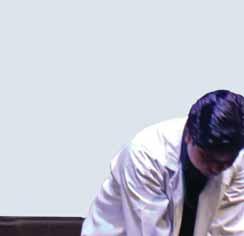


Rasheeda Bhagat

One of the highlights of the platinum jubilee celebrations of Rotary Club of Nagpur, RID 3030, which turned 75 on December 13, was to ask the 55 inmates of Matru Seva Sangh, a school for mentally-challenged children that the club has been working with for the last several years, what they wanted for Christmas this year. The children quickly came out with their requests for this initiative called the Wishing Tree, which the club has been doing for three years, and these were put upon the Whatsapp group of the club which has some 150-odd members (the total strength of the club is around 250).
“It came as a pleasant surprise to us that within two hours, members had come forward to fulfil all the wishes







Right: DG Rajendra Bhamre recognises the Club President Parag Paranjpe and Secretary Namita Sharma during the Platinum Jubilee celebrations.
Below: (from L) AG Arun Mittal, DG Bhamre and Club President Paranjpe distribute gifts to children at the Matru Seva Sangh.






of these children,” says Namita Sharma, Club Secretary, adding, “and many members who wanted to play Santa Claus too, were regretful that they weren’t able to fulfil a wish.”
The children had been asked to submit their wishes on beautifully crafted leaves, which were placed on the cut-out of a tree. Their wishes were simple enough; on top of the charts was a Chota Bheem colouring book — three children wanted it. It was easy enough for the Rotarians to sponsor this as each book costs some `45! While one teenager, a girl of course, wanted a make-up kit, another wished for a pink frock. A battery-operated car, watches, a carrom board, etc were other gifts desired. All of the children were given these gifts, with the Rotarians dressed as Santa Claus delivering them. DG Rajendra Bhamre also gave out some gifts.
Namita explained that RC Nagpur’s relationship with this Seva Sangh goes back several years. For instance, a couple of years ago, club members while visiting the place “found some children walking on all

fours, and because the floor was very rough and broken in many places, they had blood oozing out from wounds.” The club undertook a project to level and smoothen the floor with concrete tiles and also provided a grab rail on the sides to help the afflicted move around with a little more dignity.
Another achievement the club celebrated in December was the sponsorship and starting of 17 Rotaract clubs, one of them being a community club. Club President Parag Paranjpe said his club members were very happy to meet and interact “with a very enthusiastic bunch of Interactors and Rotaractors. It was heartwarming for us to hear
The wishes of the children were simple enough; three children wanted Chota Bheem colouring book. It was easy enough for the Rotarians to sponsor this.
Understanding the need of the hour, Team Rotaract decided to not only install computer lab but also to teach students in their free time.


that these youngsters are so inclined towards community service. Organising medical camps, teaching their maids, visiting oldage homes and undertaking a cleanliness drive in the city are a few projects in which they are actively participating.”
A project that the Rotaractors are undertaking is giving a computer lab to the Kewalramani Girls College, which has about 3,000 students, most of them from very poor financial background. The college had no computer lab.
“Understanding the need of the hour, Team Rotaract decided to not only install a computer lab but also to teach students in their free time.” A Four-Way-Test board and computer lab at this facility was inaugurated by DG Bhamre.
A project close to the heart of the club members is providing a nutritious meal to the 108 children at Antar Bharti School, a local daycare centre for






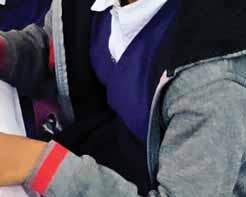

kids in the age group 1–6 years, who reside in slums nearby. “We have taken on the commitment of providing milk and one nutritious meal a day to the children of this school for the whole year, and have successfully been doing this project for four years,” said Namita. Over the years the club has refurbished the school kitchen, provided an LPG connection and a gas stove, utensils and this year given it a water filter. The programme is run with donations from members, with a `8,000 donation taking care of the meals for an entire month. “Nutritionists from our club have helped them to make a meal plan which is suitable for growing children,” she added.
Another small project of the club is micro credit and to mark its 75th Charter Day, the club distributed loans of `10,000 each to 10 women from two slums for starting small ventures. This year, 41 women have been helped through this scheme.



One of he club’s iconic projects is the Hemalkasa surgical camp, which has been going on for 33 years, with over 5,000 major surgeries done for tribals.
The day began with an Assembly presided over by the DG and there was a recap of the history of the club and thanking the past presidents who have worked so hard to make RC Nagpur a vibrant club.
Some of the iconic projects of the club done over the last few decades were recalled. One of
them is the Hemalkasa surgical camp, which has been going on for 33 years, with over 5,000 major surgeries done for tribals. The club has been protecting several waterbodies in Nagpur for the last 19 years, and a watershed programme, which is ongoing for two years, has irrigated an area
of 700 acres, benefitting eight villages inhabited by 5,500 villagers and 10,000 cattle. Udaan is a special project of this club; for the last nine Valentine’s Days, the club gives a special treat to about 8,000 special children.
Twenty-nine past presidents of the club were honoured.



When RIPN Shekhar
Mehta was recently taken around the Puduthangal Lake in Tambaram, Chennai, around 30 acres in extent, which the Rotary Club of Madras, RID 3232, has renovated in partnership with a corporate, and he saw it filled with water and heard the enthusiastic response of a local beneficiary that thanks to this project “all our wells are full”, he urged the club to renovate 100 lakes!
“When he said this, my immediate response was ok, we will do it,”, smiles past president of the club P N Mohan, who started the lake renovation project when he was club president in 2017.
And the same evening, when his club, a vintage club which completed

90 years last year, along with other clubs, hosted a reception for Mehta, Mohan told the other club members that he would need their support if this number was to materialise. But he points out that it will serve a better purpose if instead of the number of lakes, Rotarians could concentrate on the acreage covered. “For instance, the next lake RC Madras is going to take up is a huge one, covering an area of 250 acres,” he says.
It all began in 2017 when Chennai was reeling under an acute water shortage and the club decided to take on waterbodies restoration work, beginning with the first lake, Puducherry Keni Lake near Sholinganallur spread over 10 acres. “This lake had disappeared under a bed of hyacinth which

Puducherry Lake after restoration.

had resulted in the release of untreated sewage into the lake,” recalls Mohan. Around this time, he met Jayshree Vencatesan from the NGO Care Earth Trust, which has a vast experience in lake restoration work. The club hired her services, and the restoration process began with the removal of water hyacinth from the tank, followed by dredging and desilting of the lake. It took about five months to remove the water hyacinth from the tank. Once the dredging work was completed, the bioremediation work began. For this an enzyme solution, mixed with palm jaggery was used. The tank was divided into eight grids and the solution was sprayed on each grid; this spraying helped to check reappearance of water hyacinth, he explains.




Once this process was over, water samples were collected from the tank and tested. It was found that the quality of water had indeed improved. “Slowly birds started arriving at the tank. First, the pelicans came, followed by other birds such as white-breasted water hen, purple swamp hen, common coot, little egrets, pond heron, cattle egrets, little grebe, pled kingfisher and many more. This lake is now brimming with freshwater and meeting the drinking and other water needs of about 7,000 people living around the lake.”

The Puducherry Lake had disappeared under a bed of hyacinth which had resulted in the release of untreated sewage into the lake.

The cost to hire the NGO and complete the work was `15 lakh; “I put on my begging cap and got the money from the industrial house Rane in Chennai,” says Mohan.
Once the Puducherry Lake was done, the club undertook another project in August 2019 — restoring and rejuvenating the Puduthangal Lake in Tambaram. The restoration work started in August 2019, and is expected to be completed by January-end. This will benefit about 50,000 people. “We took RIPN Mehta here and he was very happy that there was freshwater here and the local community was so grateful to Rotary.” Their wells are full, there is adequate drinking water and as this is a rainfed lake, the Rotarians have provided piped inlets to bring in water from the nearby higher areas.
On the maintenance of the lake, he says, “We’ve hired a person on a monthly salary to check there is no throwing of garbage or seeping in of
In our club we always have consensus of the past, present and future leaders, without which there is no point in doing a project.
sewerage water.” The community has formed an association, and an MoU has been signed with the club to maintain the lake, and keep the place clean. Mohan explains that lakes are restored in two phases; first being rapid assessment essential for restoration, followed by the actual restoration work.
The restoration of this lake cost around ` 45 lakh, and this time the Sun Foundation came on board to help with the funding. “I must admit that it is such a generous support from our corporate partners which has made it possible to carry out such projects,” adds Mohan.
With the past, incoming and future club presidents on board, the project continuity is assured. “In our club we always have consensus of the past, present and future leaders, without which there is no point in doing a project,” he says.
Now a third lake has been identified — the Madambakkam Lake in Chennai which covers a mammoth area of 250 acres. The project cost is `1.5 crore and will be met through a global grant, for which an application is already under process.
Designed by N Krishnamurthy
Rotary Club of Panaji Riviera, RID 3170, distributed jackets and gloves to 100 garbage collectors of the Municipal Corporation of Panaji City. The outfits are meant to provide them protection and keep them clean as they go about their job of maintaining cleanliness across the city.
In another initiative, the Rotarians provided aprons to 50 fish cutters in the city’s fish market. “They were looking dirty with all the stains on their clothes. So we decided to give them

a decent clothing that will give them a professional look and improve their hygiene,” says the
Club President Yogish Kulkarni.
The bright yellow jackets and the aprons
sport the Rotary logo which will help to promote Rotary public image.

RCMansa Royal, RID 3090, began the new year with a medical camp under Rotary’s Project Positive Health-Stop NCD. At the inauguration of the medical camp, DG Rajeev Garg
propagated Rotary’s campaign — Ek chammach kum, chaar kadam aage, urging people to consume less salt, sugar and oil, and practise walking as an exercise for better health.
Around 200 people from Mansa and surrounding villages registered for the camp, said the Club President Amit Goyal. Senior medical and paramedical faculty from the Max Hospital, Bathinda, examined the patients for blood sugar, neuropathy and thyroid. The cost of the project to the club was ` 40,000 while the hospital and Medilord Pharmaceuticals took care of the medicine supplies and the medical team. Patients in need of advanced treatment were referred to the hospital.
PDG Prem Aggarwal said that the club has been conducting a series of medical and blood donation camps involving college students and youth in a big way in the last two decades.
V Muthukumaran
In a first-of-its-kind initiative in Thiruvananthapuram, RC Trivandrum Central, along with its partner RC Kazhakuttom, RID 3211, set up four dialysis machines at the Sri Ramakrishna Ashrama Charitable Hospital for chronic kidney disease (CKD) patients at a cost of `25 lakh. This centre is a good example of how “wishful thinking can translate into a useful healthcare project for the needy if the club members are resourceful and hardwrking,” said PDG Suresh Mathew. You don’t need big money to execute grand projects, but have to “dream big and be resourceful enough to implement ideas,” he said. Initially, RC Trivandrum Central, the implementing club, and RC Kazhakuttom, the partner club, had contributed a dialysis machine each and “we were planning to apply for
a global grant to procure three more machines, when Major Donors K Janardanan Nair and Dr S V Lekshmi came forward to sponsor one more dialysis unit,” said V Balagopal Nair, President, RC Trivandrum Central.
This Rotary couple has inherited the legacy of Dr Kochu Kesavan Nair, a gynaecologist and father of Janardanan Nair, who started the Ramakrishna Hospital in 1939 and practised medicine till his death in 1996. The two sisters of J Nair — Shyamala Devi and Radha Devi — have also pitched in by sponsoring the fourth machine (each cost `6.45 lakh).
Mathew said the two clubs are now using this synergy for other mega projects, including a standalone dialysis centre with more machines, for which land has been identified.

An MoU was signed with the hospital to provide at least 1,200 subsidised coupons a year to Rotary for giving to needy patients. Against the cost of `1,600–2,000 in normal category, under the subsidy scheme the Rotary centre will charge around `400–500.
“We started the project discussion in Aug 2019, signed the MoU in September and inaugurated the facility in three months,” said Balagopal. A nephrologist will visit the centre three times a week.
PDG Mathew is happy that the clubs did not go for a global grant as “it takes 18–24 months to implement projects. Club presidents want to see their pet projects implemented during their term.” GG is not the right choice for clubs planning a ‘ limited-scale project with a fixed time schedule.’

Mathew recalled how during his governorship (2017–18), G N Nair, Treasurer, RC Trivandrum Central, had envisaged a Rotary Mammogram Centre at the Government Medical College. “He spoke to State Finance Minister Dr Thomas Isaac who pulled the strings to make KSFE, a public sector undertaking, sanction `25 lakh under its CSR initiative to set up the mammogram facility which will be inaugurated shortly.” This CSR partnership gave the clubs the confidence to think of big projects.
In the coming year, RC Kazhakuttom will take up the standalone dialysis centre for “which we have identified an international partner and we will be applying for global grant for this mega project,” said Shyam Starry Pereira, Club President. DG Shirish Kesavan has agreed to set aside a DDF of $10,000 for this mega dialysis centre. Happy faces
Despite odds and limited money, Sugandhi (31), a CKD patient, has to travel 30 km from her house at Nedumangad, city suburb, for free weekly sessions at the Government Medical College and at a private

Dialysis patient Sugandhi and her family with PDG Suresh Mathew, RC Trivandrum Central President V Balagopal Nair (4th from L), DG Shirish Kesavan, Pereira and to his left Associate Governor Reynold Gomez.
medical college where she was charged ` 1,800 for a sitting. With a smile on his face, her husband Kannan said, “we are keen to avail the subsidised service at the Ramakrishna Hospital which is closer to our home.” Mohammed Navaz is relieved that he can take his ailing sister Rafkhan Beevi (52) to a hospital where they had visited many times to avail OPD services.
While the Ramakrishna Mission spent ` 15 lakh for the Rotary
In 2010, Kerala had just 300 dialysis machines and Thiruvananthapuram, its capital, had 80 of them. Now, the State has around 3,300 machines and the capital has 800 units. “In spite of the dialysis units being set up at government hospitals, the growing demand from CKD patients far outstrips the supply,” said V Balagopal Nair, President, RC Trivandrum Central, RID 3211.
Addressing a large gathering at the inauguration of the Rotary Dialysis Centre, DG Shirish Kesavan said Rotary leaders in India had clinched a deal with the manufacturers to procure around 5,000 dialysis machines at a bulk discount of 25 per cent and urged the clubs to utilise this offer for their communities
Earlier, Legislator O Rajagopal inaugurated the Rotary Dialysis Centre in the presence of Sasthamangalam Councillor Bindu Sreekumar. Hospital Adhyaksh (chief) Swami Mokshavratananda welcomed the Rotary leaders, government officials and performed the rituals.
Centre, the two clubs donated dialysis machines worth `25 lakh.
A community health centre (CHC)cum-PHC in Palode on the outskirts was adopted by RC Trivandrum Central at a cost of `10 lakh. “It serves to the needs of tribals,” adds Mathew. In another tribal outreach, the club is providing electricity to 25 poor families in Kottoor, a forest area 70 km from city, at a cost of `1.5 lakh. A well and two toilet blocks at a total cost of `2 lakh benefit 30 tribal children of a government primary school and 300 families in this village, said Balagopal. A child and maternity block at the CHC, Puthenthope, was revamped at a cost of `6–7 lakh by RC Kazhakuttom and “we are still maintaining it and supplying their medical needs,” said Pereira. With floods ravaging parts of Kerala in the last two years, a wells rejuvenation programme has desilted and deepened badly-damaged household wells of poor families at Chengannur, Kottayam, Vaikom and Ranni, Pathanamthitta, last year and this year the club will do another 200 wells in Kozhikode.
Pictures by V Muthukumaran


Abhinandan Shetty receives his award from RI President Mark Maloney as (from L) RIDs Bharat Pandya, Kamal Sanghvi, PRID C Basker and RPIC Rajadurai





Public Image Award - 1Shashi Sharma3141
Public Image Award - 2Dr Shailesh Palekar3131 Social Media AwardPriyesh Bhandari3053
Print Media AwardSubhash Jain3012 Two Sustainable ProjectsRajiv Sharma3030
Soza3220
Hari3190
Shetty3182
Girish3160 S Piraiyon2981





Sandhya Rao


When the mind is confused by excessive and misplaced emotions, we can always find books that help us understand. Here’s one.
It’s been sitting on my bookshelf for a while now:
If The Oceans Were Ink by Carla Power. A Pulitzer Prize finalist and named one of the ‘10 Titles to Pick Up Now’ in O, the Oprah Magazine, it is a book for readers across the social spectrum as the nominations themselves suggest. The tagline says it is about ‘an unlikely friendship and a journey to the heart of the Quran’.

The friends in question are author Carla Power and Islamic scholar Sheikh Mohammad Akram Nadwi. They are equal partners on this journey: on the one hand there’s the author’s interest in the Islamic world thanks to having spent a large part of her growing years in Tehran, Kabul, Delhi and Cairo, and her work as a journalist; on the other is the Sheikh’s remarkable scholarship and insight that took him from studying in a madrasa in a small village in Uttar Pradesh to the prestigious Nadwatul Ulama in Lucknow where he also taught, to researching and teaching in
Oxford. The beating heart of Carla’s quest to understand the Islamic world, particularly after 9/11, is the Sheikh’s quiet and consistent insistence on seeking the answers in the Quran itself. But, he points out, it is so rich and can sometimes be so complex that we often end up going only to interpreters. This complexity is acknowledged in chapter 18: verse 109: ‘Say, even if the ocean were ink / For (writing) the words of my Lord / The oceans would be exhausted / Before the words of my Lord were exhausted / Even if we were to add another ocean to it.’
And even if they have, they don’t understand it.” Much of what is commonly believed to be Islamic is based on systems of law and philosophy devised by scholars who came after the Prophet and who developed an elaborate system of fiqh or jurisprudence, based on interpretations of the Quran. These only took them away from the source, the Sheikh tells Carla.
Take the subject of women scholars. During the time that Carla and the Sheikh were engaged in studying the Quran, he had begun researching the female scholars of the hadith, the Prophet’s sayings, expecting to find about 30 or so names to pop up. Instead, he found some 8,000! This eventually led to his compiling a 40-volume biographical dictionary in Arabic of the muhaddithat as the female scholars of the hadith are called. Currently Dean of Cambridge Islamic College, the Sheikh speaks of Umm al-Darda, a seventhcentury jurist from Damascus. “Akram found that as a young woman, she used to sit with male


Providing a gist of what the book says is quite frankly beyond my ability. However, there are many relevant and shareable moments that can illuminate our understanding. For instance, when Carla confesses to the Sheikh at their first official meeting to embark on their study (at the Nosebag Café off Oxford’s main shopping street, by the way) that she’s never read the Quran, he responds with, “Most Muslims haven’t read it either.


Living in the West does not prevent a person from being a good Muslim. “Is any government stopping you from being pious?”

theology. ‘I’ve tried to worship Allah in every way,’ she wrote, ‘but I’ve never found a better one than sitting around debating other scholars.’ Carla goes on to add, “Akram’s research suggested she was very much her own woman. An orphan, she’d go to mosque without covering her head, and for a time she could be found praying in the men’s rows rather than the women’s. In her classes in Damascus and Jerusalem, she counted men, women, and even a caliph among her students.”
short because that is what Western women do. They think I am a liberal. But really, I am just going back to the sunna of the Prophet.”
He bases his position on a hadith that reported that after the Prophet died, his wives all cut their hair short. In another, certainly more contentious instance, a parent called the Sheikh wanting to know what to do with their unmarried daughter who was pregnant. He told them to help and support her and not to judge her in this world because she had already sinned and would face consequences in the afterlife.


As Carla writes, “Akram’s tolerance came from a belief... in a God-centred universe, nobody has freedom, and nobody has the right to judge others. That is God’s job. The Quran is not merely a guide, but a means to broaden the mind.”
firestorm didn’t injure God or the Prophet, neither of whom needed defending. But it did great damage to the world’s view of Islam.”
Further, he pointed out, “Khomeini was not very liked in Muslim countries. This was just Khomeini trying to get back respect in the hearts of the Muslims.”
Akram’s response to a fragmented world, Carla discovers, is prayer and acceptance: “The conscious practice of patience and faith lent dignity, comfort, and meaning to lives spent far from home.” In Akram’s words, “For a long, long time, Muslims have been very concerned with the space. We think, ‘If I had a better space, it would be better.’ The Muslim reformers think, ‘If we had the caliphate, it would be better. If we get a Muslim state, it will be better.’ We think, ‘If we go to Saudi Arabia, it will be a better country.’

Indeed, “during the Prophet’s era, women prayed freely in mosques along with men, but in time, many cultures began restricting their presence. Over the centuries, the scholars’ consensus that women didn’t have to go to mosques to pray, if they couldn’t get away from home and the kids, morphed into a cultural norm that said they shouldn’t”. The Sheikh helps Carla understand the difference between a custom or cultural practice, and faith. The practice of wearing the skull cap, for instance, he points out is not an Islamic requirement, it’s a South Asian custom that’s caught on. If the wearing of hijab is banned, that’s fine because nobody can take away your faith, and that’s what matters.
He tells Carla, “Some people think women shouldn’t cut their hair
The book records that when Akram first came to the Oxford Centre for Islamic Studies in 1991, its director asked for his opinion about what should be done about The Satanic Verses. Salman Rushdie’s novel had caused a furore and Ayatollah Khomeini had issued a fatwa calling for the novelist’s death. Akram’s response to the director was, “Ignore it.” He pointed out that “protesting would only hurt Muslims. The Satanic Verses

Go to Saudi Arabia... and you’ll see there’s no freedom.” He exhorts his students: “When you come to the space given to you by Allah, don’t complain. Learn how to use it. Think!” Besides, he says, living in the West does not prevent a person from being a good Muslim. “Is any government stopping you from being pious?” he asks.

Over the centuries, the scholars’ consensus that women didn’t have to go to mosques to pray, if they couldn’t get away from home and the kids, morphed into a cultural norm that said they shouldn’t.
At the end of the year of study with Akram Nadwi, what Carla realises is that the Quran is not “merely a set of pages between two covers”; “it is a place to which the faithful return, again and again”. The act of return — to the prayer mat, to the Quran, to the classical texts — often affords an expansion of the worldview, not a restriction. That’s how faith works across the board. And maybe that’s what we need today — faith.

The columnist is a children’s writer and senior journalist.
Jaishree
Deepak Gupta, Engineering goods manufacturer, RC Ghaziabad, RID 3012
This year has enriched him with a good experience but he wishes that each day has 48 hours and each year, 700 days. “All the presidents are enthusiastic to execute some big project that can benefit their community, so a year is not enough to accommodate their zealous plans,” says Deepak Gupta.
He is keen on promoting cervical cancer vaccination. “My dream is to extend the vaccination cover across the district. Probably then our government will be inspired to take it on a national level,” he says. The district is also planning to create 40–50 happy schools with global grants. Besides, the governor is also keen on extending partnerships to execute projects in Sri Lanka, Brazil and Mexico.
A Rotarian since 2001, Gupta is soon to become an AKS member and has given $100,000 to TRF. He wants to increase the district membership with 400 new members but is also keeping a check
on phantom clubs that are created to enhance the vote bank numbers. “I have not chartered any new clubs until the DGND elections were completed.”
The district has 26 per cent women members. Two clubs have been formed with children of Rotarians as members and three more are in the pipeline.
His goal for TRF contribution is $500,000 and he is happy that the district’s endowment contribution will be around $100,000.
“We will have four Endowment donors this year,” he says.
His wife Reena is also a Rotarian and has launched a unique ‘Anns can teach’ programme where the spouses of Rotarians visit rural schools three days a week and teach various subjects to children.

Jitendra Dhingra, Rice manufacturer, RC Kurukshetra, RID 3080
He was a Rotaractor until 1984 and a Rotarian since 1992. Jitendra Dhingra cherishes his volunteering trips to Rwanda as part of a Rotary medical mission in 2015 and is looking forward to a similar assignment next month, to Zimbabwe.

Dhingra is happy that his district is installing solar lamps in remote areas in Leh, Ladakh and Rourkee. It is disheartening to see that some of these places do not have electricity at all, he laments. The district has signed two global grants to transform two schools into Happy Schools and will be providing various infrastructure
and basic facilities that are lacking in these schools. “It is our responsibility to see that schools are attractive enough for children to come with enthusiasm and learn,” he says.
The district has 3,800 members across 87 clubs and Dhingra plans to increase the membership by 10 per cent. He is also happy that the 550 women Rotarians are actively participating in various humanitarian projects of the district. He has recently chartered an all-women’s Rotary club and one more is in the pipeline, he says.
His goal for TRF contribution is $5 million and he is confident of reaching it by making all clubs 100 per cent PHF.
Sridhar Balaraman
He was inspired to join Rotary after he was invited by his Rotarian-friend to distribute food to polio-affected children studying in a school run by Rotary. “It was my birthday and the plight of these children moved me. The next thing I knew was joining Rotary,” says Sridhar Balaraman.
He is excited to talk about the district’s major project — enhancing dialysis facilities in the district — for which he is the Project Chairman. While eight dialysis units have been installed in Vellore with a global grant of $100,000, 17 more were added this year with local donors’ support. The Tanker Foundation helps in the functioning of these facilities. So far 12,500 dialysis procedures have been done, he says, adding that he plans to add more machines here and set up three more centres in Kanchipuram, Tiruvannamalai and Tiruvallur through global grants.
He has chartered seven new clubs and inducted 420 members. “Two clubs are all-women’s clubs with 64 members in each,” says Balaraman. The district now has seven such clubs. He is looking at installing 111 new clubs by end-June.

His commitment for TRF is $1 million. “We are planning to contribute to the Polio Fund in a significant way through the ‘Two dollars for two drops’ campaign and encourage 30 Major Donors of which 10 have been identified,” says the DG. There will be five Endowment Donors and the rest of the money will be raised through Term Gifts.
“I call my presidents ‘Dazzling Leaders’ and the district has a hashtag — ‘Service and Fun unlimited’. So I am confident that my team will perform in a big way and involve themselves in service projects as much as they enjoy Rotary’s fellowship,” signs off the DG.
He became a Rotarian at 26 in 2004.

“I had just then lost my father and Rotary gave me the strength and confidence to face life and its challenges,” says Karthikeyan who has been an Interactor and Rotaractor during his younger days.
One of his cherished moments in Rotary is creating records while promoting Rotary’s public image that focuses on literacy and polio eradication programmes.
The governor has a varied range of service projects lined up for his district, the priority being facilitating education and healthcare for girl children and providing career guidance to help them with livelihood. A mobile mammogram facility costing ` 2.5 crore and a blood bank at a
cost of ` 1.5 crore have been completed.
“We are going to provide treatment to children with heart disease at the MGM Hospitals in Chennai on Feb 23. Clubs have been urged to sponsor the treatment,” he says.
The district has 5,200 members and Karthikeyan wants to improve on this with 15 per cent. So far, 600 new members have been inducted. He is keen on introducing more women to Rotary and has urged the clubs to concentrate on that.
On TRF giving, he aims to raise $500,000, of which he has received commitment for $350,000. Besides, he has contributed $100,000 to the Foundation during his installation.
Designed by N Krishnamurthy
Kiran Zehra
Behind his thatched roof house at Maval, a small village to the east of Pune, Natha Maharaj Shelar, a rice farmer, tends to bees kept inside a wooden box. “Through this additional activity, my income will increase by `15,000 a year and I will be able to invest in a water pump,” he says.

Four other farmers in the region are also now pursuing beekeeping or apiculture thanks to RC Pradhikaran, RID 3131, distributing bee harvesting boxes to them. “Our aim is to improve the environment in this village while involving, and improving living standards of the local community,” says Club President Bahar


Shah. Each bee box contains 30,000 worker bees, 100 drones and a queen bee. The wooden box includes a bottom board, a hive body or two, several honey supers and an inner cover. An outer cover fits on top. The design and dimension of the artificial hive is based on the concept of bee space and comes at the cost of `5,000.



Honeybees building honeycombs on a frame.
Below: Vijay Mahajan, Founder, Shivsagar Madh Udyog, talking on beekeeping to villagers.


Vijay Mahajan, Founder of the Shivsagar Madh Udyog that manufactures organic raw honey in Pune, trains these farmers in beekeeping and also buys back their raw honey and processes it for sale in the retail market. “Each farmer can earn around `150 for one kg of honey. In one season the earning can go up to `4,000 per box. The current demand for organic honey in India alone is 20 lakh tonnes. Our Udyog is willing to buy honey from these families at a predetermined price,” he says.
Apart from honey, the bee wax can be sold to pharmaceutical companies at `300 per kg. It will take approximately a year for these farmers to scale up and they can decide to buy more bee-harvesting boxes depending on the money they make.
Mahajan, who is currently training 10,000 farmers on beekeeping in Arunachal Pradesh, explains that beekeeping alone won’t provide enough income for farmers to make a living. But bee pollination will increase the crop yield for farmers. “ Beekeeping brings additional
income and the farmers have understood that honeybees play a large role in maintaining the biodiversity of plant ecosystems. Plants depend on bees and other insects as pollinators. This can improve crop yield by 20 per cent annually,” he adds.
Bahar adds that currently under the Khadi Gram Udyog scheme the government helps farmers with loans to generate additional income by investing in different kinds of farming. “We wanted to give farmers a foundation before they approached the banks for loans. This programme focuses on the livelihood of farmers, conservation of environment, development of organic market, and training and information sharing with farmers. We intend to include more farmers in this initiative.”
Back at his house Maharaj Shelar says, “I grow on my farm rice, tomatoes, groundnut and brinjal. I work hard in the field and to come home to the buzzing of the bees is a delight. I don’t have to do much and it is exciting to know that I will reap a sweet benefit from this venture.”

Hank Sartin

When you’re in Honolulu for the Rotary International Convention from June 6 to 10, you’ll find that the city offers an incredible array of great restaurants. And you won’t have to venture far from the
Hawaii Convention Center to get a delicious meal. For breakfast, Aloha Kitchen has standard fare such as Eggs Benedict and omelettes, but the house specialty is soufflé pancakes, an airy take on the breakfast classic. If
you’re up for a slightly longer walk (1.2 miles), the Nook offers some exotic twists on your morning meal, such as orange blossom pancakes, coconut caramel waffles, and mochi waffles made with rice flour.
Nearby lunch options span the globe, from Kickin’ Kajun to Hokkaido Ramen Santouka and Do-ne Japanese Food. For dinner, Korean Kang Nam is a barbecue restaurant known for its yakiniku (grilled meat). Get a group together and order one of the combination platters.
For classic brewpub food — which in Hawaii means poke and seared ahi salad along with chicken wings, burgers, and pizza — try the Waikiki Brewing Co and be sure to sample the beers.
And for a cool snack between breakout sessions, head out for shave ice, a Hawaiian treat, at Snow Factory and Ice Monster Hawaii.
Don’t miss the 2020 Rotary Convention in Honolulu. Register at riconvention.org by Mar 31 to save.
©The Rotarian
Over 7,000 people benefitted from a two-day medical camp organised by RID 3292 in collaboration with RID 3523, Taiwan. Named Rotary Nepal Taiwan Medical Mission, the camp, coordinated by RC Baglung, was held at the Dhaulagiri Zonal Hospital in Baglung. A team of 90 medical experts in various specialisations treated patients and distributed medicines to the needy. Around 150 Rotarians from Taiwan also participated in the programme.
The club sponsored medical equipment for various hospitals. An ECG, ultrasound machine and two dental chairs were donated to the Dhaulagiri Zonal Hospital. The Parbat and Damauli District Hospitals got an ultrasound machine each. Governors of RID 3523 and 3292, Joy and Kiran Lal Shrestha participated in the event.

Foundation recognition points are awarded to donors who contribute to The Rotary Foundation through Annual Fund or PolioPlus, or towards sponsorship of a Foundation grant.
Donors receive one recognition point for every dollar contributed to these funds. Contributions to the Endowment Fund and Directed Gifts are not eligible for recognition points. Donors can transfer Foundation recognition points to others to help them qualify as PHF or Multiple PHF.
A minimum of 100 Foundation recognition points must be transferred, and Donor must complete and sign the Recognition and Transfer Request form. The recognition points cannot be transferred from individuals to a club or district.
Club and district leaders can view the online “Club Recognition Summary”, which includes recognition amount, recognition points, current PHF level, and date that level was achieved through My Rotary login.
A recent amendment of Sec 135 of the Companies Act, 2013 with respect to unspent CSR amount of corporates is given below:
“Any CSR amount remaining unspent pursuant to any ongoing project, fulfilling such conditions
as may be prescribed, undertaken by a company in pursuance of its Corporate Social Responsibility Policy, shall be transferred by the company within a period of thirty days from the end of the financial year to a special account to be opened by the company in that behalf for that financial year in any scheduled bank to be called the Unspent Corporate Social Responsibility Account, and such amount shall be spent by the company in pursuance of its obligation towards the Corporate Social Responsibility Policy within a period of three financial years from the date of such transfer, failing which, the company shall transfer the same to a Fund specified in Schedule VII, within a period of thirty days from the date of completion of the third financial year.”
Rotary clubs and districts may approach corporates and solicit their unutilised CSR funds.
Grant management resources are now available in Rotary’s Learning Centre. Find courses on making project sustainable, conducting community assessments, planning effective projects, managing grant finances, qualifying club for Rotary grants and reporting on grants. Consider using the online courses as a way for clubs to get qualified for a Foundation grant or combine them with a shorter in-person training that give members a chance to
discuss district requirements and ask questions.
DGEs, DRFCs and district trainers now have access to the Learning Centre’s reports on the courses taken by members in their districts. These reports can be used to track training in your district and manage the qualification process. Complete the “Access to Learning Centre Reports” course and receive your first report within two weeks. Send questions to learn@rotary.org.
Using Grants and Cadre Reports on My Rotary Reports on My Rotary can help Rotary members manage their grant activities and find members of The Rotary Foundation’s Cadre of Technical Advisers who can help them with grant projects. To find out which report to use to gather various kinds of information, log on to “My Rotary” and then select “Manage”.
The Rotarian-Digital is an absolute replica and an alternate of the print copy. The e-copy is available at half the price ($6 for six months) and can be subscribed through an email to data@rotary.org through respective Rotary club officers. Members should have a valid email address to receive the magazine regularly through email. In places where the postal system may not be as reliable, we strongly recommend subscribing to e-copy of the monthly magazine.
Life can be full of joy every moment if you look at everything through eyes of joy, listen to everything with ears tuned to joy, smell, touch and taste everything with senses filled with joy. It is your joy that transforms everything you commune with into a thing of beauty. It is your light that illuminates everything just as the Light of the Source illuminates you.
The energy of joy. Joy is the antidote for stress. When we are filled with joy, our cells produce immense energy. According to ancient Indian wisdom, joy is a fundamental quality of life. It is ananda, it is light expressed as a feeling — a luminous sensation. Often, our rishis would be so beautifully aligned in their vibrations with the Source, they would be in a trance, united with the Source of Joy. And people around them felt it as an enormous pool of peace, something magnetic and hugely soothing.
Unhealthy cynicism. What keeps us disconnected from our natural fount of joy are toxic emotions and attitudes — anger, fear, helplessness, depression, sorrow, anxiety, despair, disbelief in anything that does not conform with our personal beliefs and disbelief, if not tempered, hardens into cynicism.
I know three people who live in a continual state of cynicism. All three are on strong medication — one for the nerves, the second for the heart, the third is on anti-depressants — to help them lead a normal life. It is distressing because they are good people, but their goodness is often obscured because it is mixed up with cynical disbelief. Thus, at times, they come across as bitter, manipulative and inflexible respectively. Suspend judgment and be comfortable in not having or offering an opinion. The mind is calm, emotions are still like a lake without ripples. As the days go by, there’s quiet evenness of a new inner balance in mind and body. And you can actually move from task to task in one unending flow. You can go smoothly from writing to doing accounts to playing a quick round of basketball to cooking, back to writing…. You don’t even switch mental gears, your concentration remains unbroken, your attention is seamless. This flow experience happens when there’s no emotion — no twitch of irritation or rage, resentment or self-pitying martyrdom — to put brakes on it. When you go through this experience, you understand how beautiful and cool a mind is without emotions. What remains is only awareness. Thoughts still come but they are of a higher quality. And if they

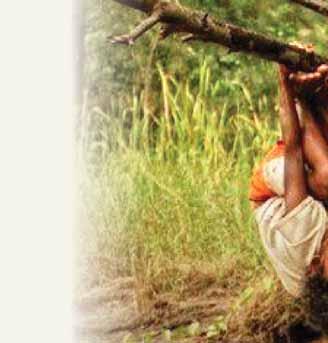




are not, you can ignore them and they go away.


Light your lamp. How do you attain this seamless flow of attention as you move from task to task, from work to play, from play to work…? By a change of attitude. How? Realise that something in you has chosen every activity regardless of whether you like it or not. Realise that at a deeper level you need to do these varied activities and that is why you have chosen them. Also, know that each activity is meant to bring light into darkness. You may not like your job… Please like it. It puts food on your table. You may not like cooking… Please like it. It nourishes you and your family. Everything we do brings light into darkness. Be grateful you can light your lamp and banish the darkness. Gratitude brings a sweet orderliness, a friction-free evenness in your temperament. This evenness is soft yet stable and can be maintained even when ‘disturbances’ occur. Somebody calls. The doorbell rings. Everything that happens is okay because it is meant to happen… something in you makes it happen… . You don’t have to have the answers to all these happenings because even these interruptions have their place in the great, big, beautiful mystery of life.
When I had this shift in perception after I changed my attitude, initially, I felt a bit disoriented. It was not unpleasant, it’s just that I’d never felt like this before. And as I got used to it, I discovered a greater peace, it’s a the-world-doesn’town-me-anymore feeling. There’s a lot of space when resistive emotions are absent. You listen to others talk and complain and chatter about the events in their lives. You understand because you’ve been there. You feel love for them spilling out of you.
Care for yourself. The wonderful thing is: to connect to one’s natural joy, one doesn’t have to be extraordinarily intelligent, wealthy, good-looking, ambitious or ‘perfect’, you just have to care for yourself. Caring is a mental impulse. When it’s a mental instinct, it is only about surviving. When it’s a mental impulse, it’s about staying well, about finding one’s way back to the vibrations of joy that pulsate so subtly, so softly through every body-cell. When we do not care, when something in us wants to hold on to anger and self-pity, our negative impulse disrupts the normal vibrations. When we care, joy flows smoothly in and around our being. It is important to keep the caring centre within us alive. I exercise because I care. I eat healthy because
I care. Meditation relaxes the mind completely, extends its awareness and lifts it out of the indifference, depression or cynicism it may have fallen into. The extended awareness helps us construct healing practices, seek cures, find all kinds of positive ways to solace. As Dr Blair Justice puts it: “The caring centre that connects us with our life force is the guardian of our inner health…”
Caring gives us the courage and vigour to change our life. As Alfiere wrote, “Often the test of courage is not to die but to live.” Courage takes a different route for different people. Some learn the difficult task of saying “No” and risking another’s displeasure. Some dare to stop making money and start spending a part of it to give happiness to those around them. Many people bravely put aside their hurt or anger or both and step out of their cocoon to forgive. Ultimately, caring is a beautiful approach that says softly so as not to be intrusive, “I’m here to free you from suffering.” It’s a great place to start from.
The writers are authors of Fitness for Life and Simply Spiritual –You Are Naturally Divine and teachers of the Fitness for Life programme. Designed by N Krishnamurthy
Rotary Club of Chengai Chennai Corridor, RID 3231, constructed concrete houses for eight families in Mettukadu, a village on Chennai’s outskirts. The village has been adopted by the club as part of its Happy Village programme and 20 families reside here. The beneficiaries of this project are categorised under BPL families. “Their so-called ‘houses’ were actually thatched huts in a pathetic state. We built each house with a 300 sq ft area at a cost of `3.75 lakh, with support from the Pradhan Mantri Awas Yojana scheme,” says Sridhar Subburaman, the Low-cost Shelters Project Chairman.
The keys for these houses were handed over to the beneficiaries in an event where the Vice-chairman of

PDG Raja Seenivasan (RID 3232) at the inauguration ceremony.
the National SC Commission L Murugan was the chief guest. DG Sridhar Balaraman and RID 3232 PDG Raja Seenivasan were
also present. Tamil Nadu Aram Makkal Nala Sangam, an NGO, sponsored new clothes for the villagers on the occasion.
Sable of Pune who has undergone root canal treatment thrice is a satisfied dental patient. “I am a regular patient at the Rotary dental clinic for the past seven years and have always enjoyed the warm service and good quality treatment here,” she says. So does Dhananjay Korde, another patient, who swears by the treatment at the clinic.
The clinic was established in 1996 by RC Pune Ganeshkhind, RID 3131, at Bopodi in Pune under the leadership of Madhukar
Shukla with a matching grant. Dental procedures are provided at a subsidised fee and by experienced professionals. The Pune

Municipal Corporation has allotted the space for the clinic. “This is the longest running medical project of our club,” says Dr Alka Pawar who had served as the club’s Medical Director. A range of posters on Rotary’s various service projects adorn the wall of the clinic boosting Rotary’s public image. “We see about 15–20 patients every day and work for six days a week. The clinic has treated more than one lakh patients so far,” says Dr Deepak Sonar, head of the medical team.
“The clinic is indeed a jewel in the crown of our club,” says the Club President Suneeta Surendra Parasnis, with quiet pride.
Kiran Zehra
To help treat burn victims in and around Manipal, Rotary Club of Manipal Town, RID 3182, has recently set up the Rotary MAHE Skin Bank at the Kasturba Hospital at a total cost of $113,317 (`80.45 lakh). It is a global grant endeavour executed in association with RCs Central Chester County, Western Henrico County, Richmond, Bon Air and South Richmond from the US, and TRF. IPDG Abhinandan Shetty had also approved substantial funds from the DDF for the project.
The Manipal Academy of Higher Education (MAHE) has provided the space for the laboratory at the hospital. The skin bank had a soft launch in Aug 2019 with Pro-Chancellor of Manipal Academy of Higher Education
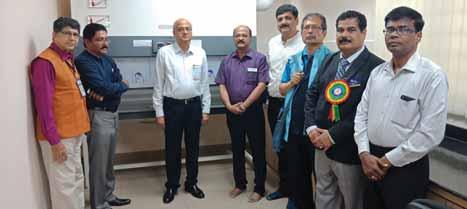
TRF Trustee Gulam Vahanvaty (centre) with (from L) Ramachandra Upadhya, PDG D S Ravi, Skin Bank Director Dr Sreekumar, PDG Abhinandan Shetty, Dr N Udupa, Project Coordinator Sesappa A Rai and Dr Basavaraj Hadapad at the Skin Bank.
(MAHE) Dr H S Ballal inaugurating its operations.
He, along with Dr Ramdas M Pai, Chancellor, MAHE; Vice Chancellor Vinod H Bhat, contributed $35,000 to TRF to set up an Endowment Fund for the skin bank. All three of them are honorary members of RC Manipal Town.
RID Kamal Sanghvi and TRF Trustee Gulam
Vahanvaty had also visited the centre and appreciated the club members for setting up the skin bank in Manipal.
Dr Sreekumar, Professor and HOD of Plastic Surgery at the Kasturba Hospital and the Director of the skin bank, said that currently, 25 donors have registered with the bank. “The skin of donors will be retrieved within

six hours of their death. It will then be processed and can be stored for five years,” he explained. Patients with over 40 per cent burns (third-degree burns) are at a high risk of acquiring fatal infections since the skin would have been burnt to an extent where it cannot heal. The skin taken from donors can be used to temporarily cover the burnt area.
Project Coordinator Dr Sesappa A Rai, added that the skin and blood do not have to be compatible. Anyone above 17 years can donate their skin and the retrieval process is similar to that of eye donation.
Dr Sreekumar and his team had earlier undergone special training at a skin bank in Mumbai to understand the process in depth.

DG A K Natesan inaugurated a toilet block at the Government High School in Andevanapally village in the presence of PDGs Vasu and Dharmesh Patel. The project cost `5.65 lakh.

A Smart Class was opened at the KAMAK School for the hearing-impaired children at a cost of `50,000. Club President Ravi Parthasarathy along with other Rotarians were present at the inaugural event.

The district trained 700 women in tailoring across its six vocational training centres. The club provided motorised sewing machines to 300 women in the first phase. The value of the district project is `30 lakh.

Club Trainer Ruchi Rai did a literacy programme by donating books to create a library in a government school in Nathupur village. Around 135 children from the nearby slum community will benefit from this project.
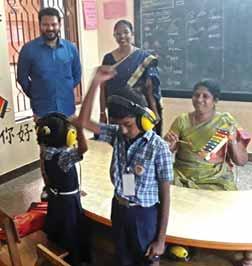
A dental check-up camp was conducted at the Zilla Parishad School in Shegaon village. Around 150 students were examined by a team of doctors. Toothpastes and toothbrushes were distributed to them.


A one-day campaign against single-use plastic was carried out at the Baba Mohan Ram Kissan College. DG Harish Gaur and IAS officer Neelabh Saxena were present at the event. The club distributed 2,000 canvas bags with anti-plastic messages at various places.
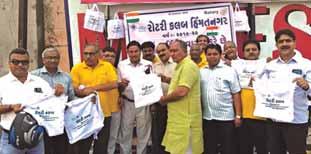

The club members distributed sweaters to children at Jilod, the club’s adopted village. The woollen garments will keep them warm during the winter months.

An inter-school Shabad Gayan competition to mark the birth anniversary of Guru Nanak, the founder of Sikh religion, was organised. Ten schools took part in the contest and DGN Davinder Singh was the chief guest.
An anti-plastic drive was held and the club members distributed cloth bags at the vegetable market in the presence of legislator Rajendrasinh Chavda and Municipality President Anirudh Sorathia.
The club provides food for attenders of patients at the Civil Hospital in the town on the first and third Fridays under its Rotary Rasoi project. A kitchen has been built for this purpose and it also serves as a temporary shelter for the attenders.

Anti-plastic campaign was organised at busy junctions, thoroughfares and markets in the city to create awareness on the harmful effects of using plastic and polythene bags. Cloth bags were distributed to people and shopkeepers. Municipality Chairperson Indu Rani participated in the drive.

A dental and eye check-up camp was conducted for students of Kashi Balika Shiksha Niketan, a girls school adopted by the club. Around 350 students were screened and given follow-up treatment cards. Toothpastes, toothbrushes and spectacles were also distributed.


A jogging track of 1.2 km was laid for the residents of the city to keep themselves fit through regular use of this facility. The track is situated amidst a scenic backdrop to attract regular joggers.

As part of Project Positive Health, the club has set up an automated office BP instrument at the Andheri Railway Station for a day during which over 150 passengers were checked for BP. Many patients were happy at the availability of such a facility at a railway station in contrast to waiting for their turn at a clinic to get their BP checked.
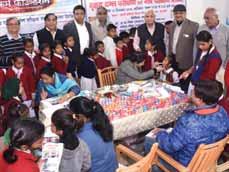
An eye camp was conducted at Kothavangallu village in which 160 people were screened for various ailments. Medicines were distributed and spectacles were prescribed for 20 people. Rotary Eye Hospital and Rotary General Hospital are being run by the club.
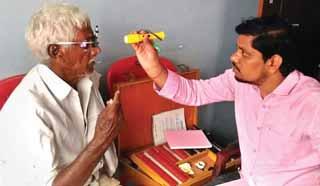
Two deformity correction surgeries were done at the One Care Medical Centre as part of the First Step Project. Two boys, aged 8 and 10, were discharged from the hospital and are undergoing physiotherapy. The project cost `60,000.


A residential RYLA was organised in which over 50 college students were trained in leadership skills, team building, emotional intelligence, creativity and interpersonal skills, among others.

Rotaract Club of DG Vaishnava College, sponsored by the club, had hired seven hairstylists to give a well-groomed haircut to mentally-ill patients at the Institute of Mental Health. They are planning to conduct this project every month.

Dress material were given to around 180 underprivileged girl students of Shanti Rani School in Bansdroni, a neighbourhood, at an event in Rotary Sadan held in association with Rotaractors and IndusInd Bank.
Rotary News Subscription Remittances
You can pay the Rotary News / Rotary Samachar subscription online
Our Bank details:
Bank : HDFC Bank SB Account
Branch : Montieth Road Egmore, Chennai
A/c Name : Rotary News Trust
A/c No. : 50100213133460
IFSC Code : HDFC0003820
E mail us following details:
Name of Club
President/Secretary’s name
of transfer/UTR Number
For physical payment by cheque or cash in bank, write Club Name only without prefixing “Rotary club of”. Eg. Rotary Club of Delhi Central should be written: Delhi Central.
at a glance
Rotarians : 1,204,996
Clubs : 35,907
Districts : 525
Rotaractors : 168,960
Clubs : 10,192
Interactors : 321,172
Clubs : 13,964
RCC : 10,853
As on Jan 15, 2020
*Please note Interact clubs that have not reported Interact Adviser in the past two Rotary years, are placed in “Suspended” status effective Oct 1, 2019.


Author

: Chitra
Narayanan
Publisher : Penguin Portfolio Pages : 319; `399
Inthis book, the author, a journalist who has covered the business of hospitality over long years, traces the origins of the hotel industry in India and tries to provide a glimpse of the future of stays. How did the Taj, the Oberoi and ITC come to dominate the hotel landscape in India? How did they cope when the international chains — Marriott, Accor, Radisson, etc — arrived, and when young disruptive challengers like Oyo emerged? The book provides a behind-thescenes look at the industry, the business models, the personalities behind the hotels and the ongoing war for supremacy.
Author : Perumal Murugan
(Translated from Tamil by N Kalyan Raman)
Publisher : Context, Westland Publication
Pages : 179; ` 359
Through a seeming act of providence, an old couple receives a day-old female goat as a gift from the cosmos. Thus, begins the story of Poonachi, the little orphan goat.
As you follow her story from forest to habitation, independence to motherhood, you recognise in its significant moments the depth and magnitude of your own fears and longings, fuelled by the instinct for survival that animates all life. Masterly and nuanced, Perumal Murugan’s tale forces us to reflect on our own responses to hierarchy and ownership, selflessness and appetite, love and desire, living and dying. Poonachi is the story of a goat who carries the burden of being different all her life, and survives against odds. It is equally an expression of solidarity with the animal world and the female species. The tale is also a commentary on our times, on the choices we make as a society and a nation, and the increasing vulnerability of individuals, particularly writers and artists, who resist when they are pressed to submit.

Author : Jairam Ramesh
Publisher : Penguin Viking
Pages : 776; `999
InJairam Ramesh’s gigantic and wellresearched biography of V K Krishna Menon, you will find all aspects of Menon’s life — childhood in a rich Malayali family, his early association with the Theosophical Society, his days in London, and above all his relationship with India’s first Prime Minister Jawaharlal Nehru. Did you know that he helped to found Penguin Books? This is a compelling biography of one of India’s most controversial and consequential public figures. Menon continues to command our attention not just because he was Nehru’s confidante and soulmate but also for many of his own political and literary accomplishments. A relentless crusader for Indian independence in the UK in the 1930s and 1940s, he was a global star at the United Nations in the 1950s before he was forced to resign as India’s Defence Minister after the humiliation India suffered during the Indo-China war of 1962.
Meticulously researched and based entirely on new archival material, this book reveals Krishna Menon in all his capabilities and contradictions. It is also a rich history of the tumultuous times in which he lived and which he did so much to shape.
The beauty of this book is that you can open any page, any chapter, and it will grip you.
Compiled by Kiran Zehra
Designed by Krishnapratheesh S
Having heard so much about New Zealand last July three of us classmates from college and our wives decided to go there. It is very far away, around 12,000 kilometres and takes almost 20 hours to get there with a four-hour-stop at Singapore, which is an experience in itself.
Having been to the country once before but not having been able to visit South Island, I persuaded everyone that we should spend most of our time there. It turned out to be a very good decision. There is no place that I have seen that can surpass the sheer scale and intensity of its natural beauty. We travelled miles and miles and miles along mountains, valleys, rivers, streams, lakes and more lakes, coasts, coves, trees, forests, flowers, fragrances and the cleanest air you can breathe anywhere on Earth. Above all, the sky is pure blue. It’s a place where beauty becomes monotonous.
But — there’s always a but — it is a very windy place. And its summer is when we have our winter because it is in the Southern Hemisphere and we are in the Northern. Even in midNovember which is the beginning of the New Zealand summer some places were bitingly cold. We really regretted not carrying heavier jackets.
The best way to travel in New Zealand is in a small group of six or eight people. Early on we decided that we would hire a van with a driver when we reached Christchurch from Auckland. It turned out to be just
the right thing. It wasn’t cheap, but I can say this confidently: it was way cheaper than India and the quality of the drive, thanks to well-informed, educated and helpful drivers, was outstanding. For eight days of being driven around South Island in good comfort — nearly 2,000 kilometres — we paid `60,000 per head. In India that would have cost double.
But hotels in New Zealand are lousy. Small rooms, the barest of facilities, third rate restaurants and the worst part, bathrooms are so tiny that you can barely dry yourself after a shower. In fact one of them even had a translucent glass door with the pot facing it! Horrible.
The motels were absolutely superb. We stayed in five on the South Island — one night at each place — and were amazed that they were all actually fully-equipped service apartments complete with a cooking range, dishwasher, washing machine and top class TV sets. Except the one at the Fox Glacier — which we weren’t able to see because it started raining,

We were taken aback at the number of Chinese tourists. Wherever we went they were swarming. In fact if New Zealand doesn’t watch out China may well want to buy it.
the others were all around 350 sqft in size. That’s just 50 sqft less than the affordable housing our government is building for the poor. The rain can be a problem because another of our excursions had to be cancelled because of bad weather. But over the 14 days we were there, those were the only two instances where things didn’t work according to plan.
To our dismay we found that New Zealand doesn’t have a worthwhile cuisine. Its food is best avoided not just because it is tasteless but also because it is very expensive. But beer and wine are cheap and top class. We stuck to Thai and Indian restaurants where the portions are large and we could share the dishes for a total of around NZ$90 for six people.
There is no place that I have seen that can surpass the sheer scale and intensity of its natural beauty.
We were taken aback at the number of Chinese tourists. Wherever we went they were swarming. In fact if New Zealand doesn’t watch out China may well want to buy it — just as sometime ago Donald Trump wanted to buy Iceland.







Seated (ground), from L: Hari Krishna Nambiar (3202); Sanjiv Rai Mehra (3011); Shabbir Shakir (3030); R Balaji Babu (2981); M Satish Babu (3020); Sunnil Mehra (3141) and S Muthupalaniappan (3232).
Seated (chair), from L: Rashmi Kulkarni (3131); Sangram Patil (3170); Gajendra Singh Narang (3040); Dharamveer Singh Bhadoria (3053); TRF Trustee Gulam Vahanvaty; RID Bharat Pandya; RID Kamal Sanghvi; PDG Deepak Purohit; A L Chokkalingam (3000); Saumya Rajan Mishra (3262); Hanmanth Reddy (3150); Karunesh Srivastava (3120) and Sandeep Kadam (3142).
Standing, from L: Jose Madhavassery (3201); B L Nagendra Prasad (3190); Rajarama Bhat (3182); Rajesh Agarwal (3054); Harish Motwani (3132); K L Venkatesan (2982); Fakir Mohanty (3261); Rajib Pokhrel (3292); Thomas Vavanikunnel (3211); Vijay Arora (3090); Alok Gupta ( 3012); Rajan Gandotra (3250); Dinesh Shukla (3110); Davinder Singh (3070); Subhasish Chatterjee (3240); Ramesh Bajaj (3080); Prashant Jani (3060); Chinnapa R eddy (3160); M Ranganath Bhat (3181); Sudip Mukherjee (3291); PNB Murugadoss (3212); Manish Sharda (3100) and Ajith Weerasinghe (3220).
Regn. No. TN/CCN/360/2018-2020
Licensed to post WPP No.TN/PMG(CCR)/WPP-431/2018-2020
Total number of pages in this monthly issue, including cover, 84. Price: `35
Registered with Registrar of News Papers for India 3880/57 Rotary News Published on 1st of every month































